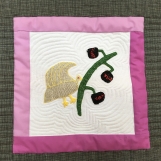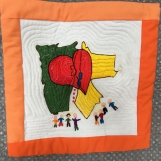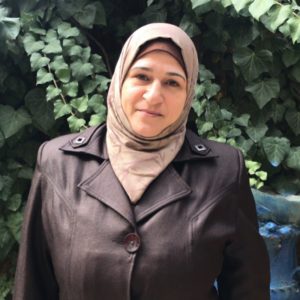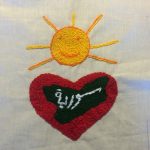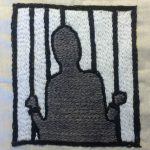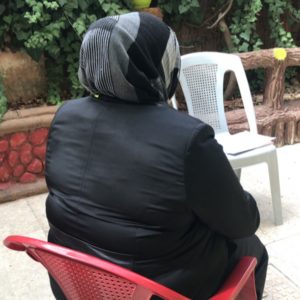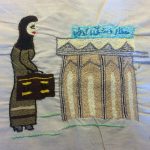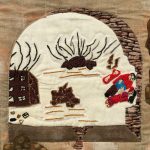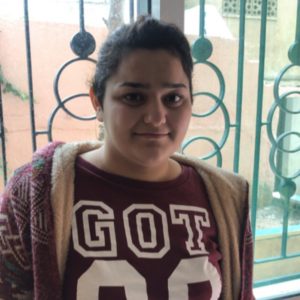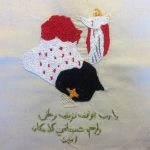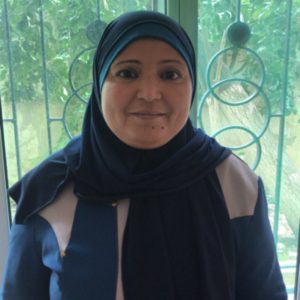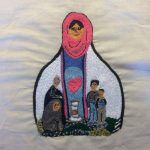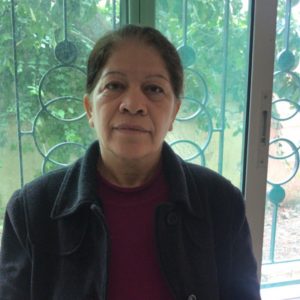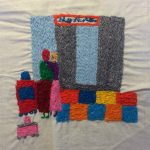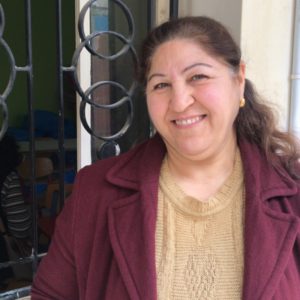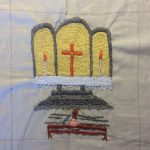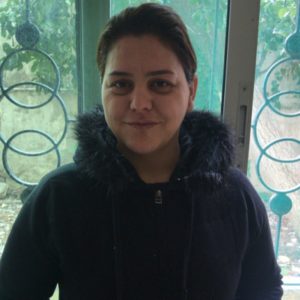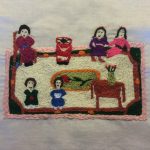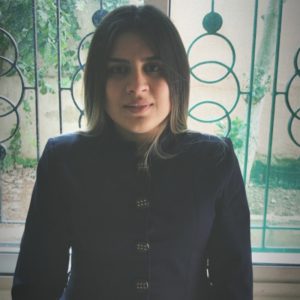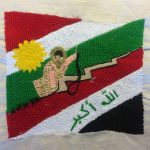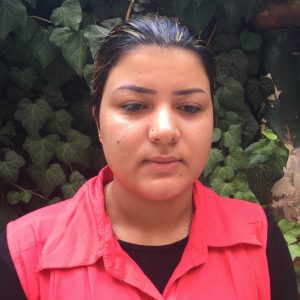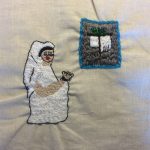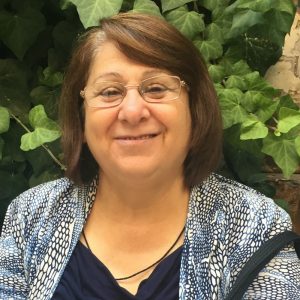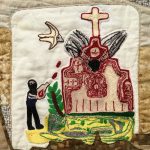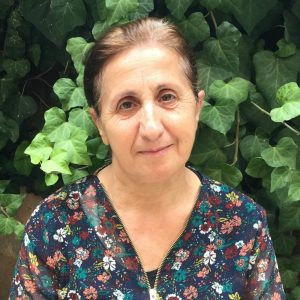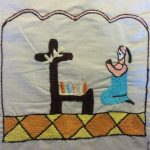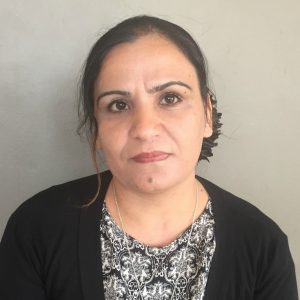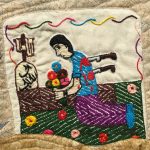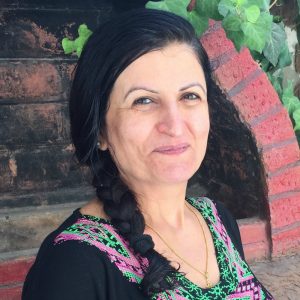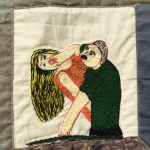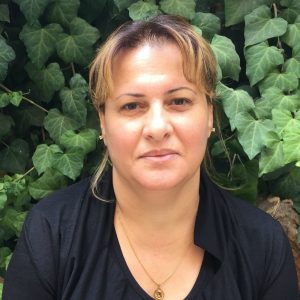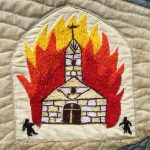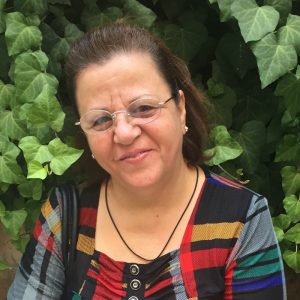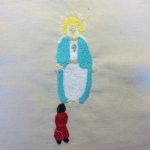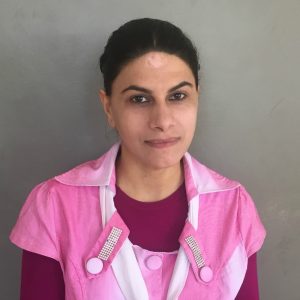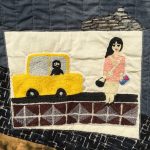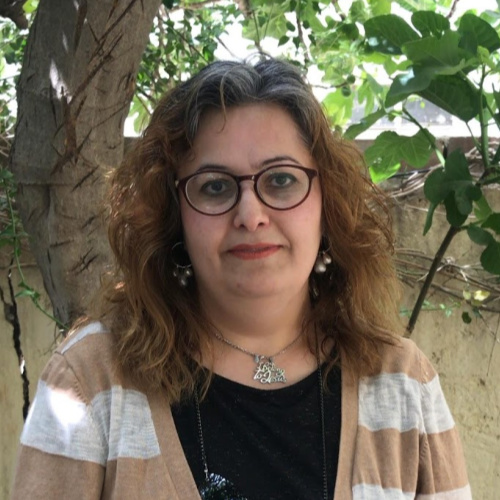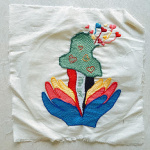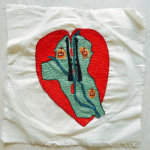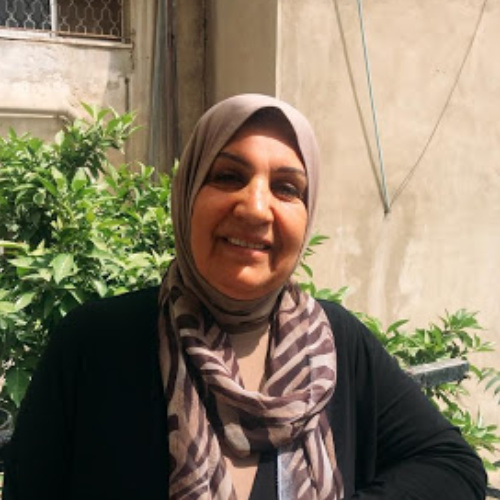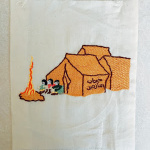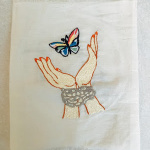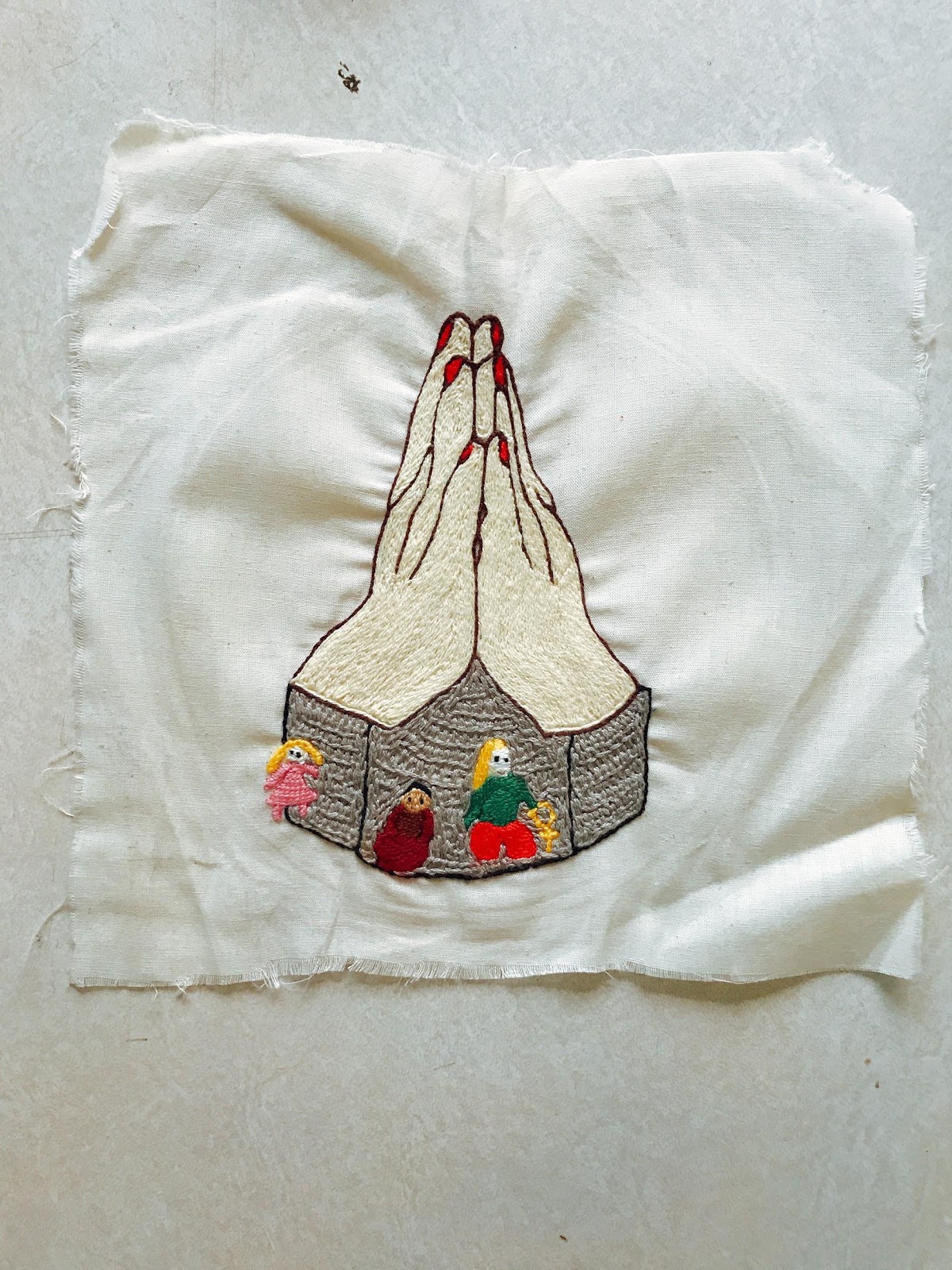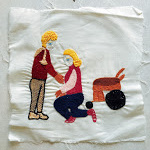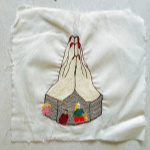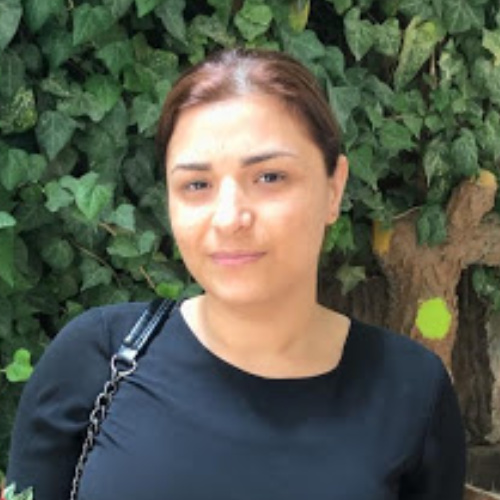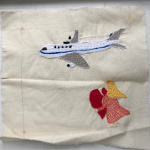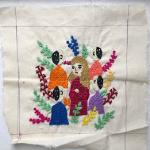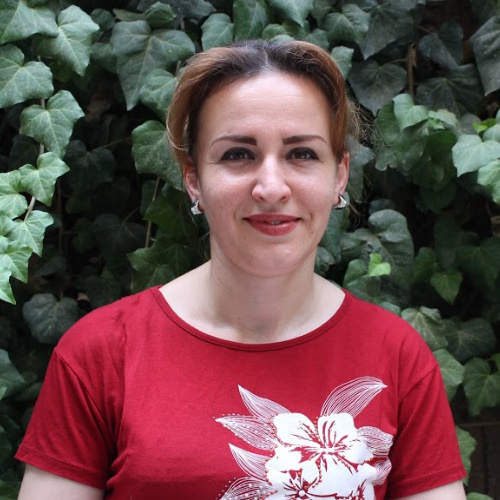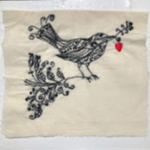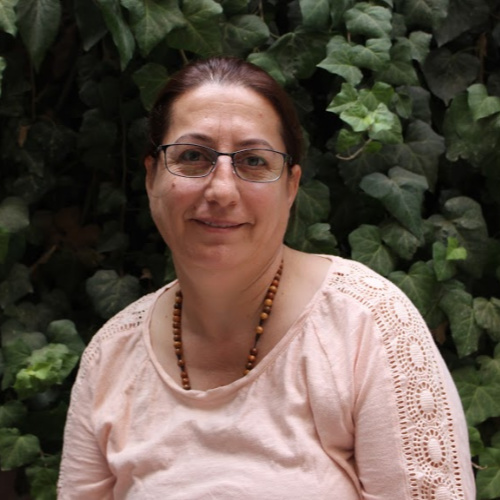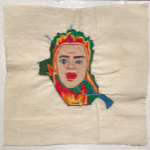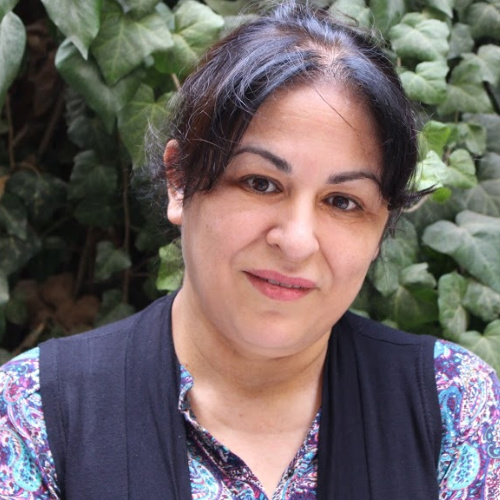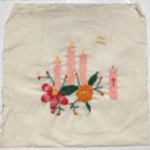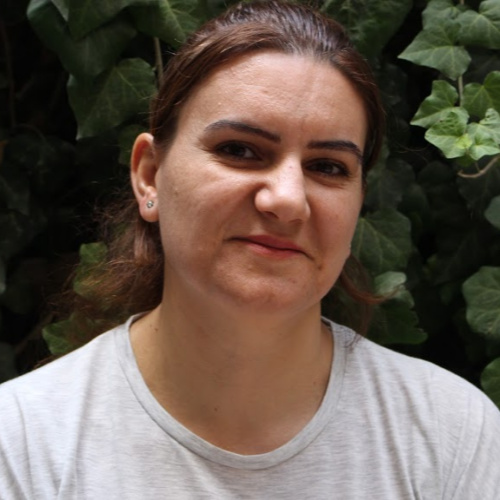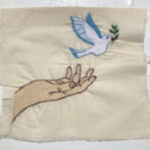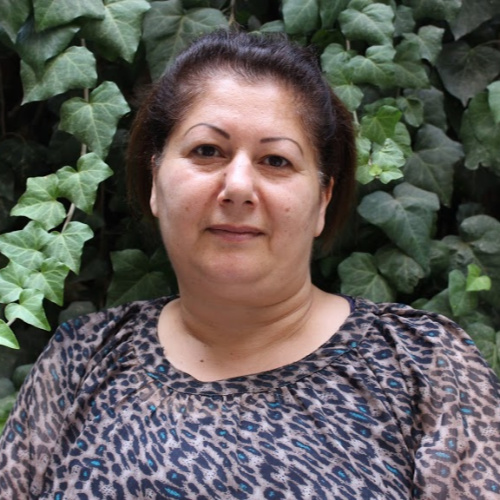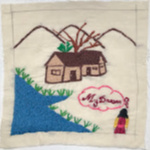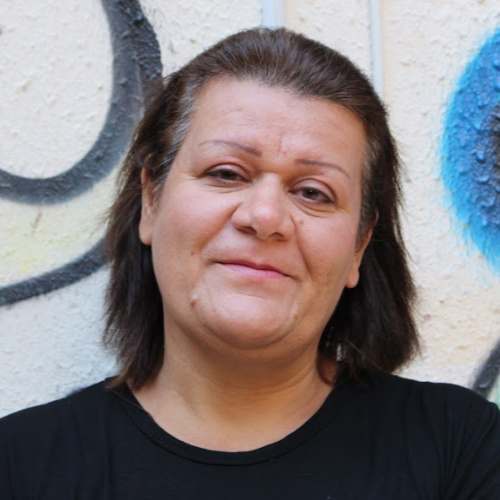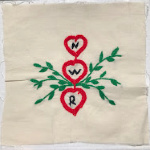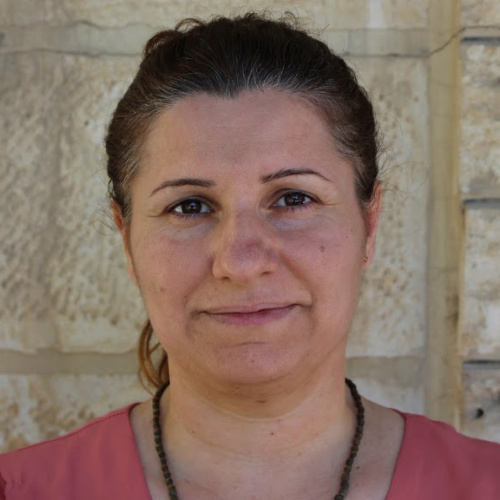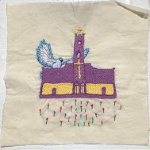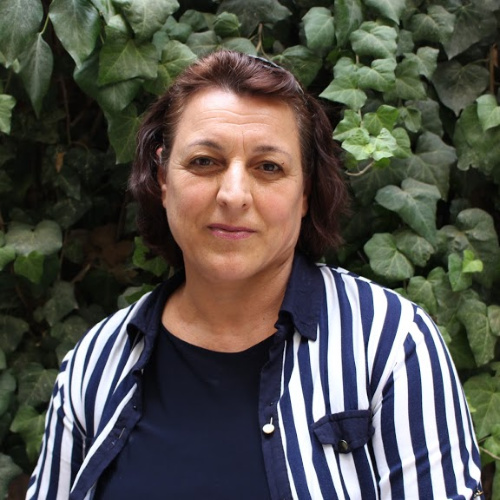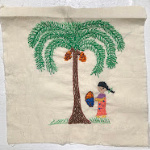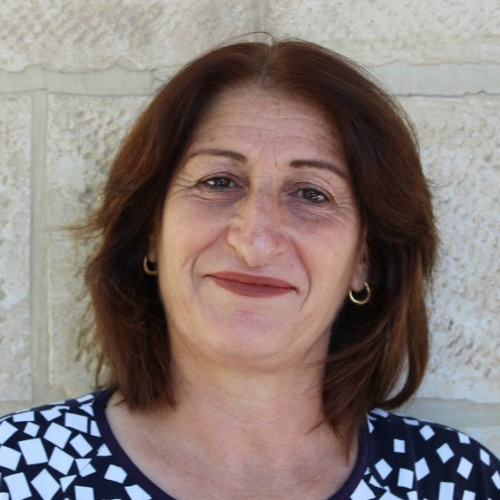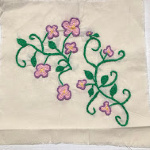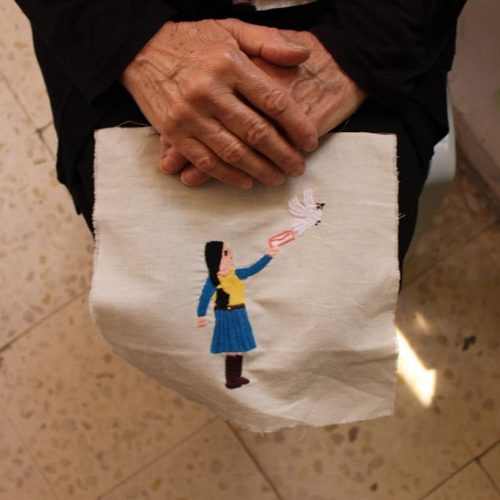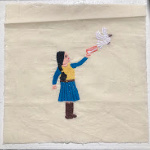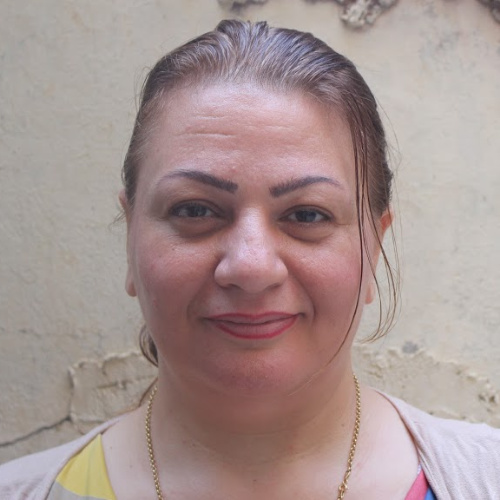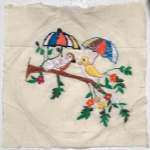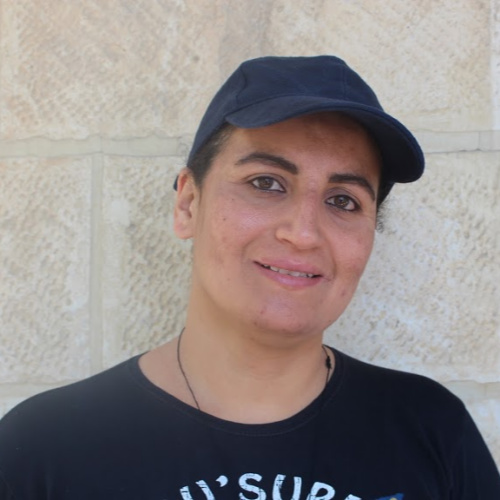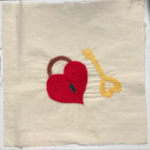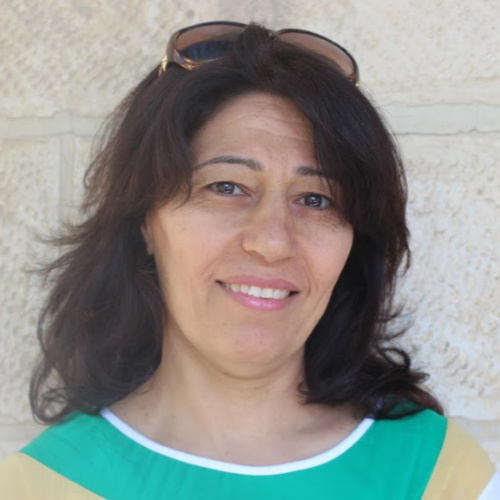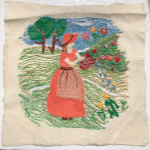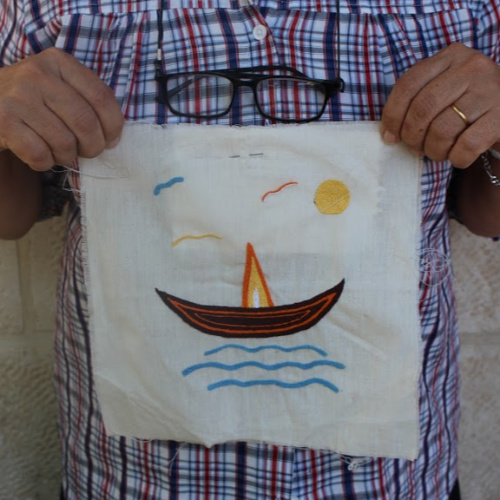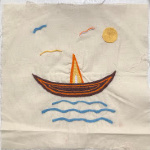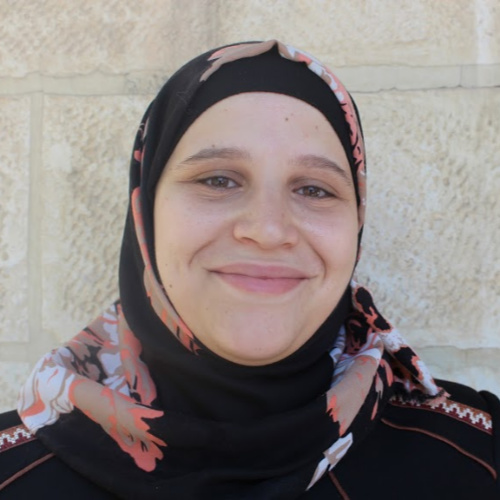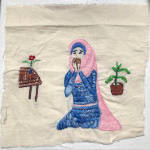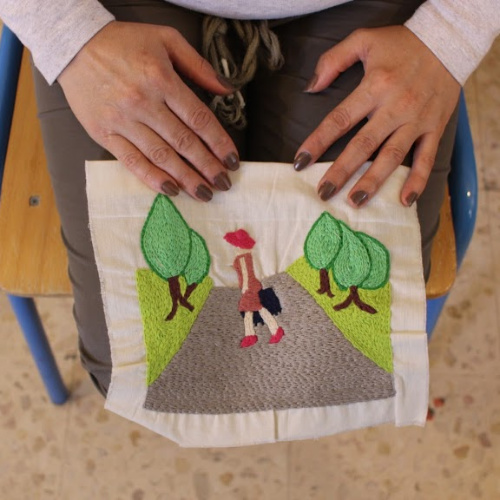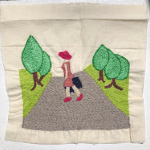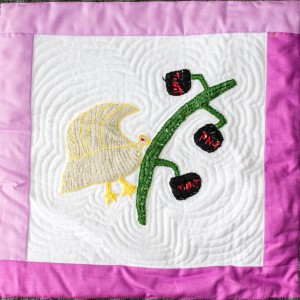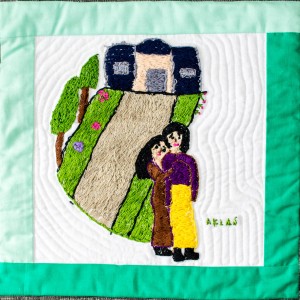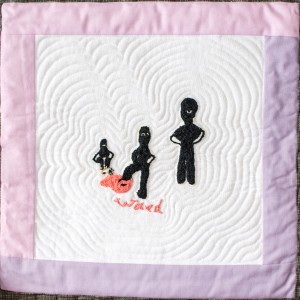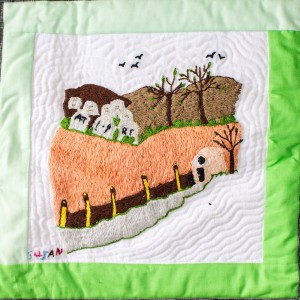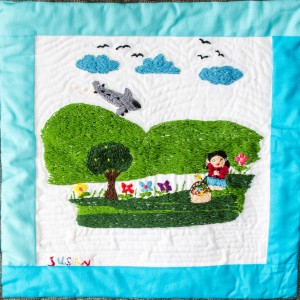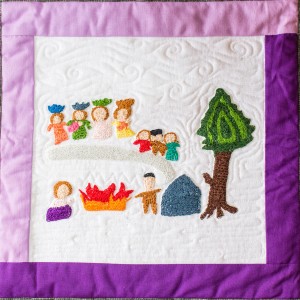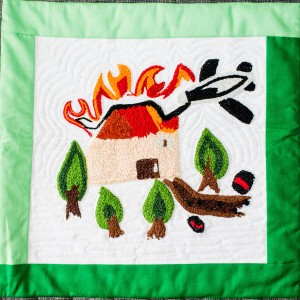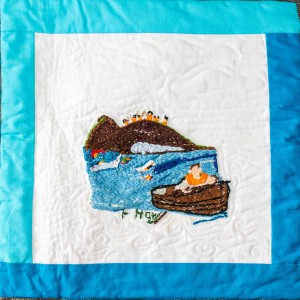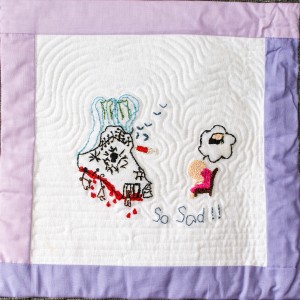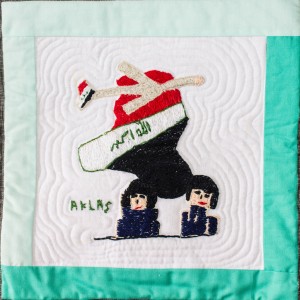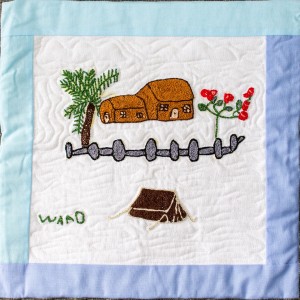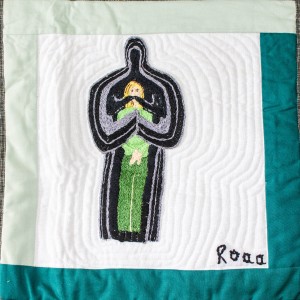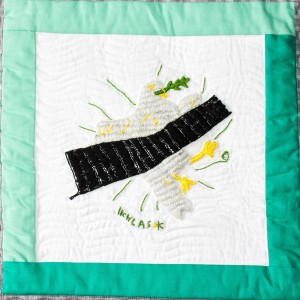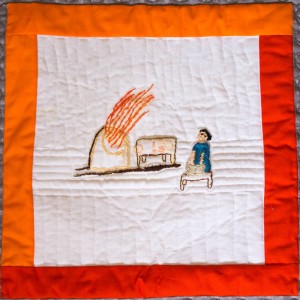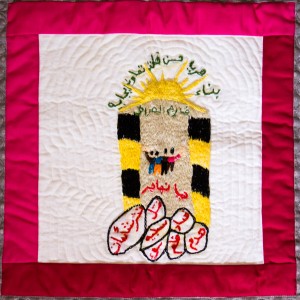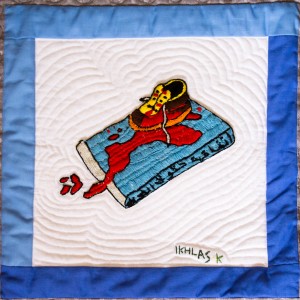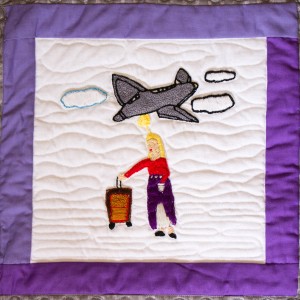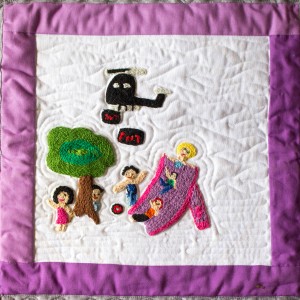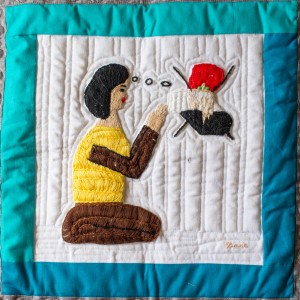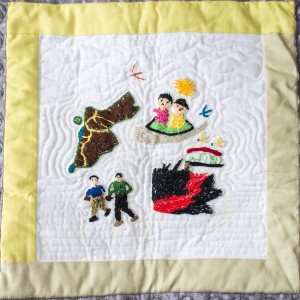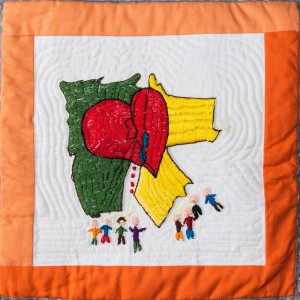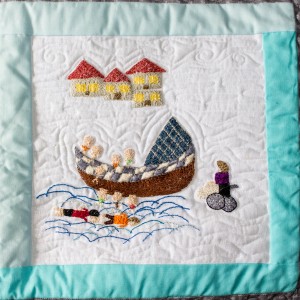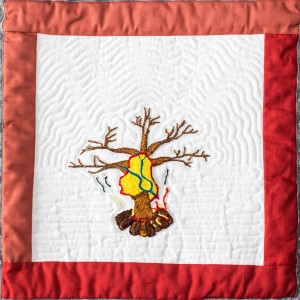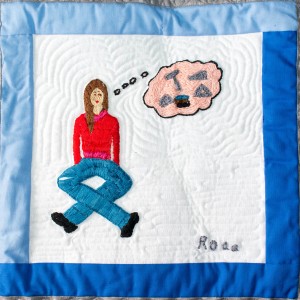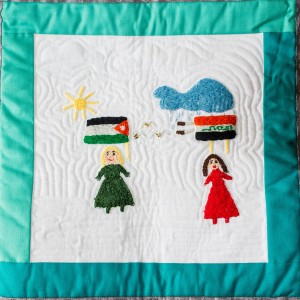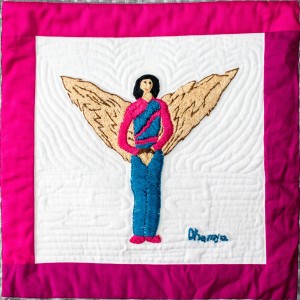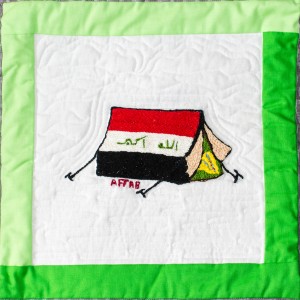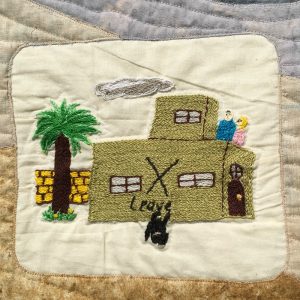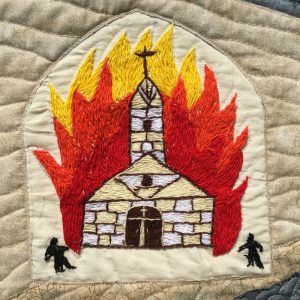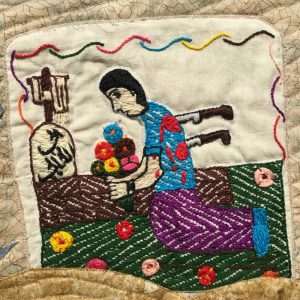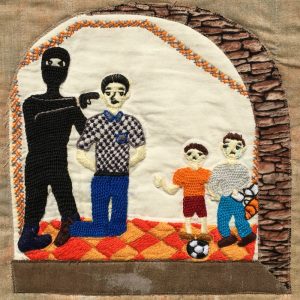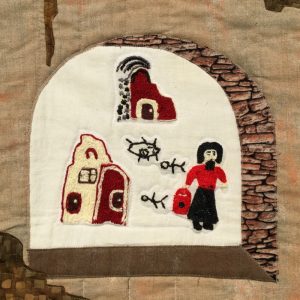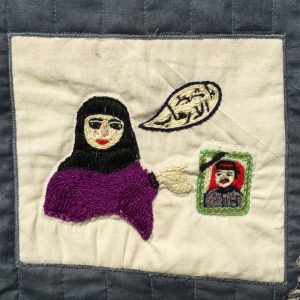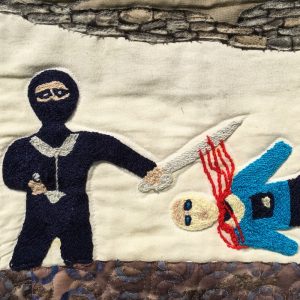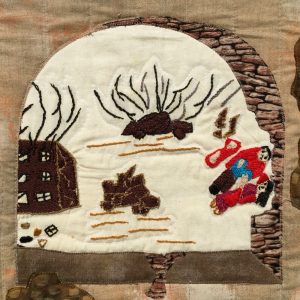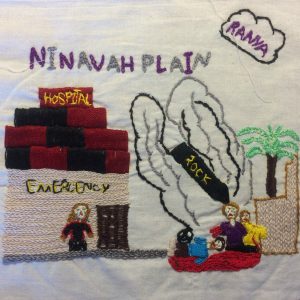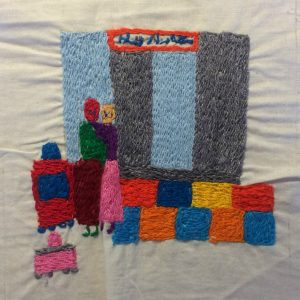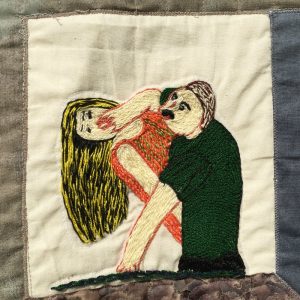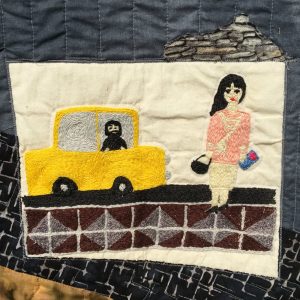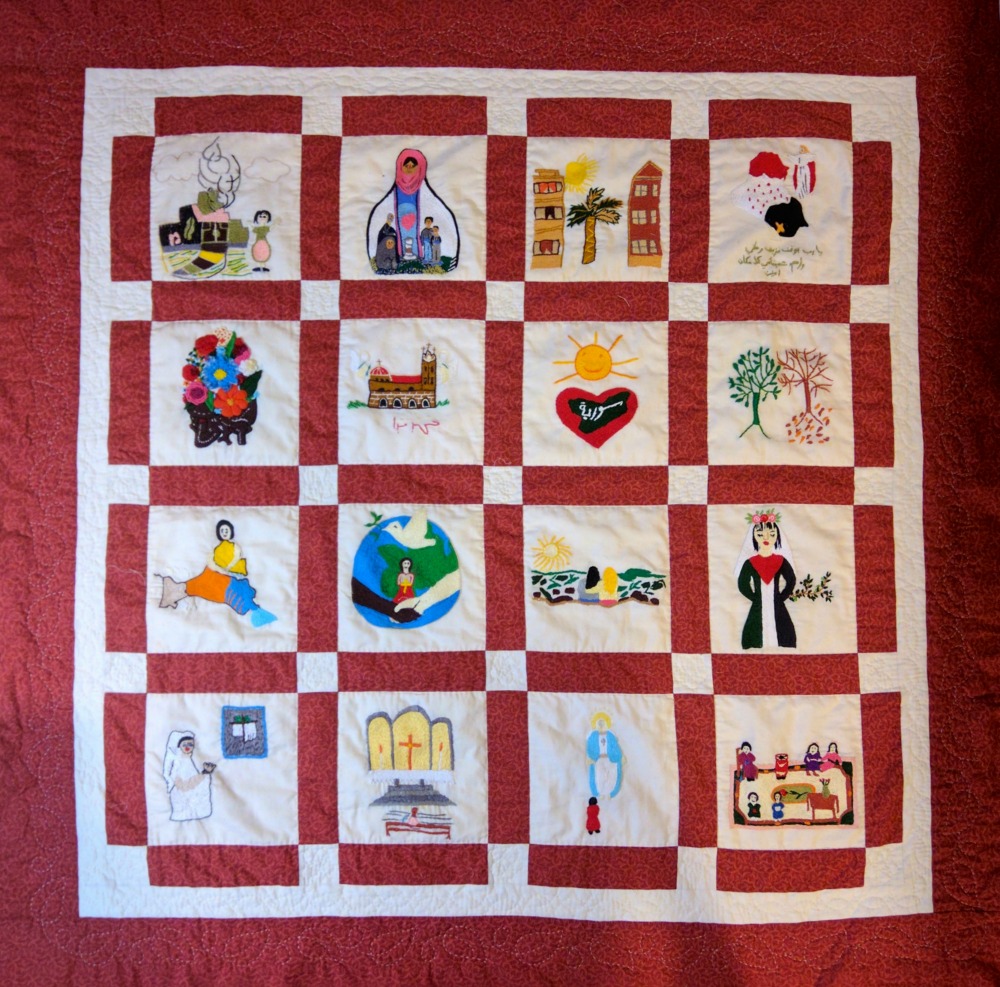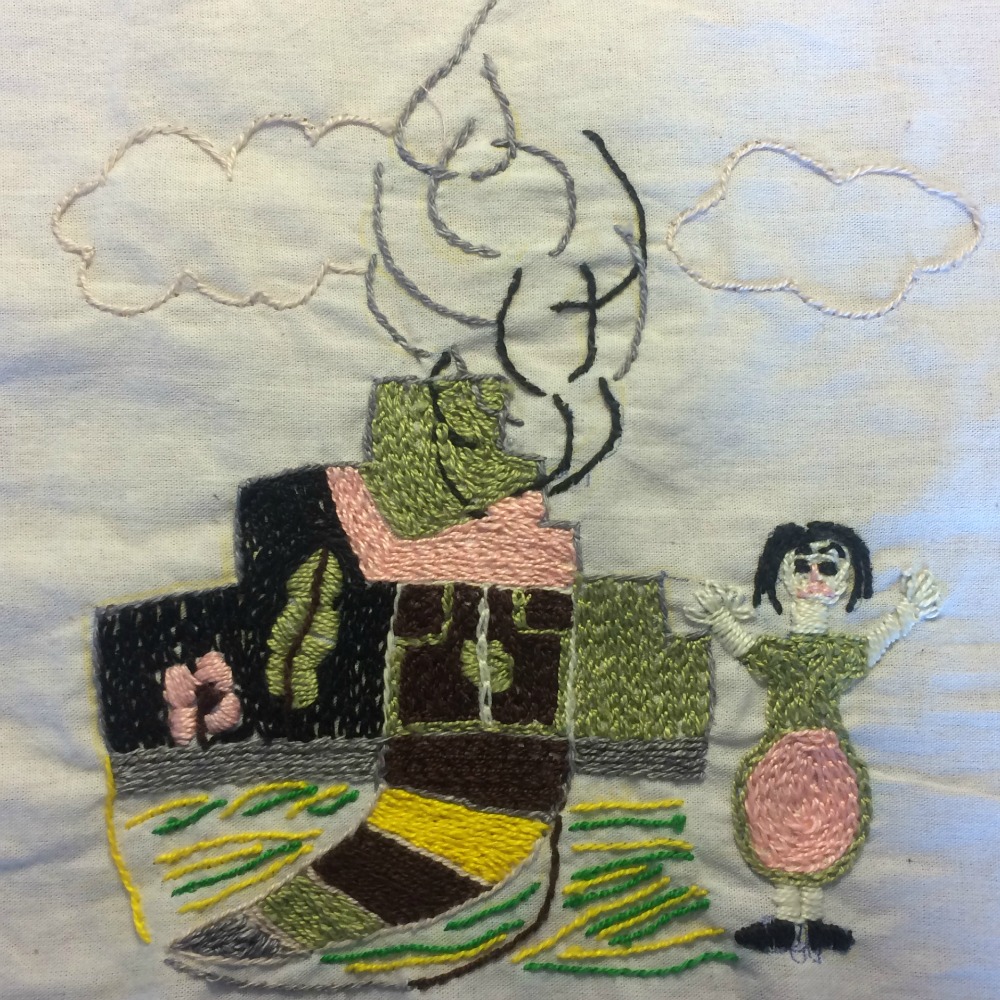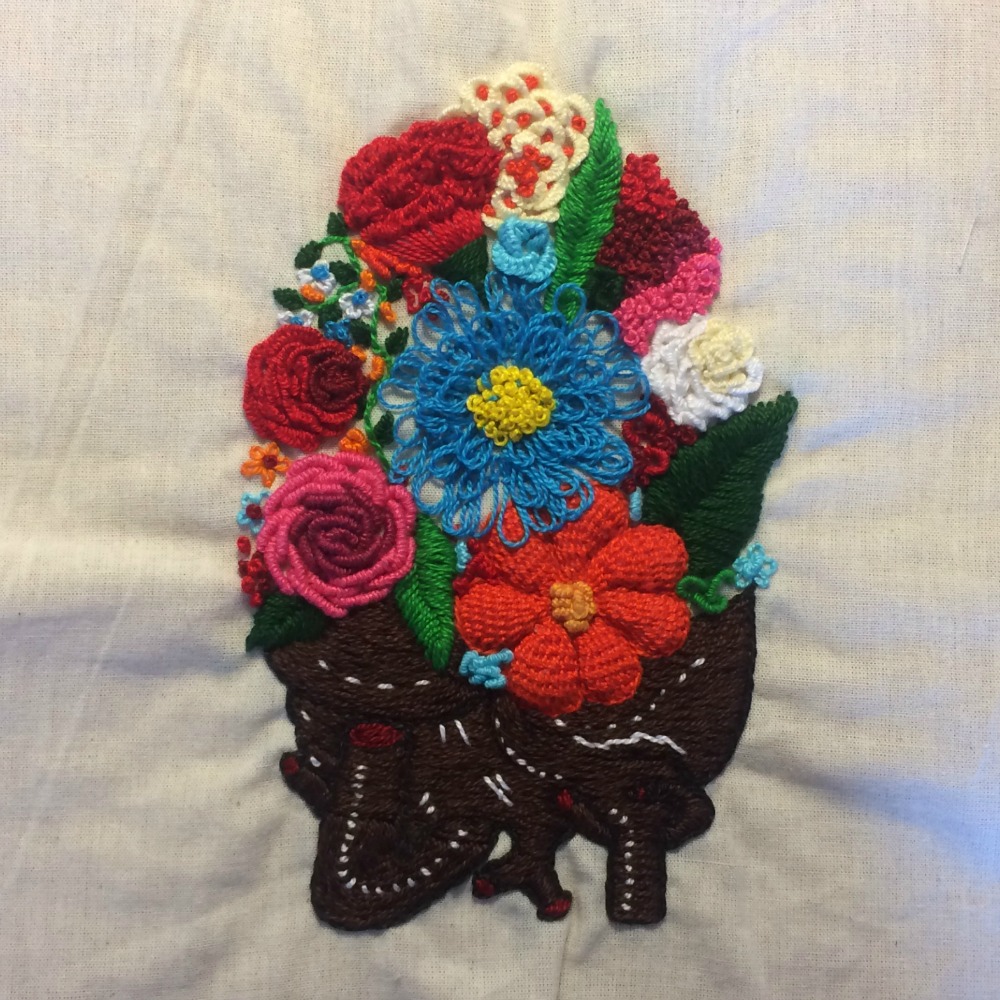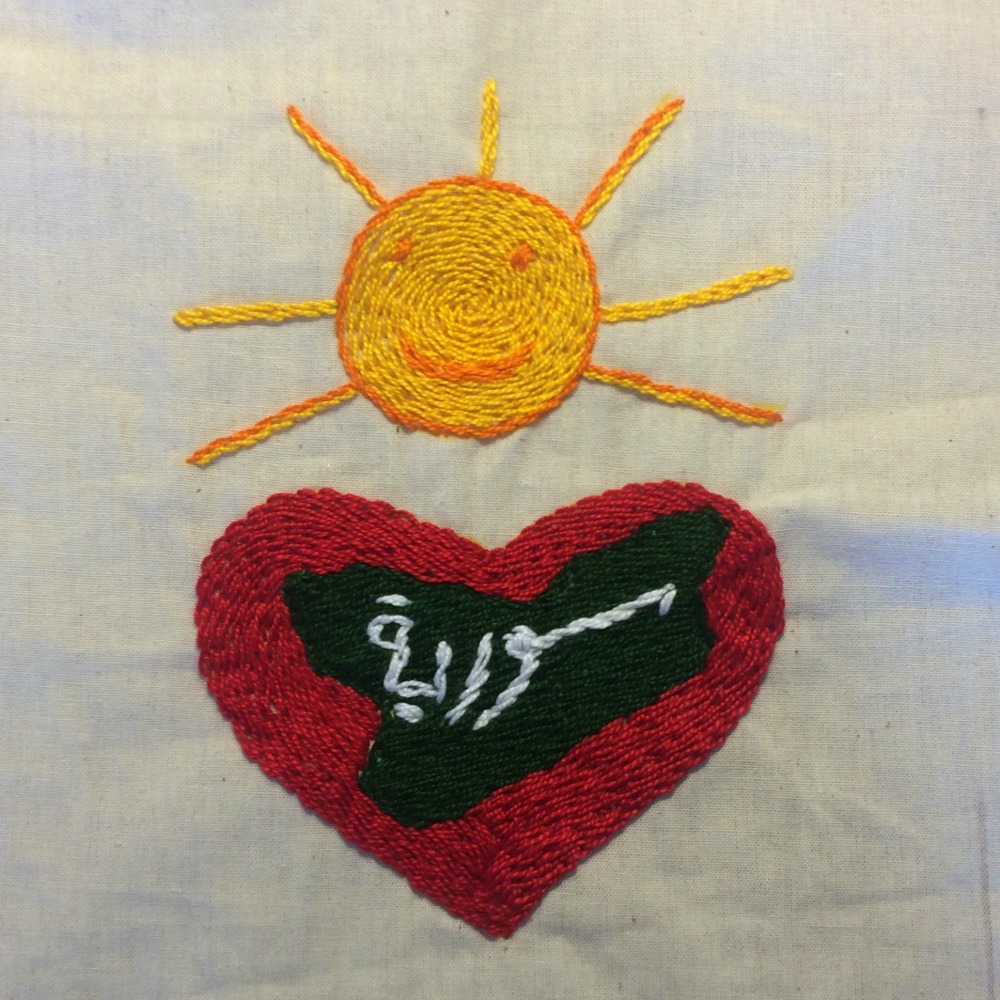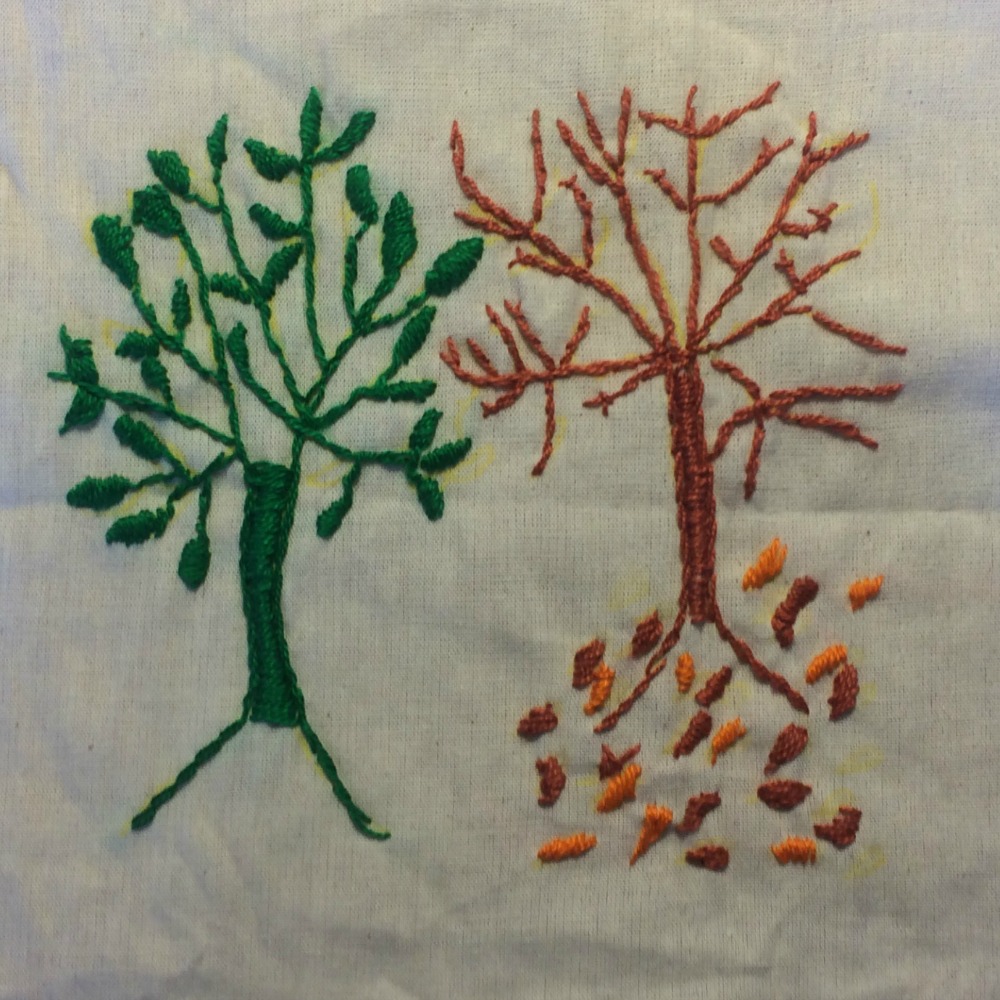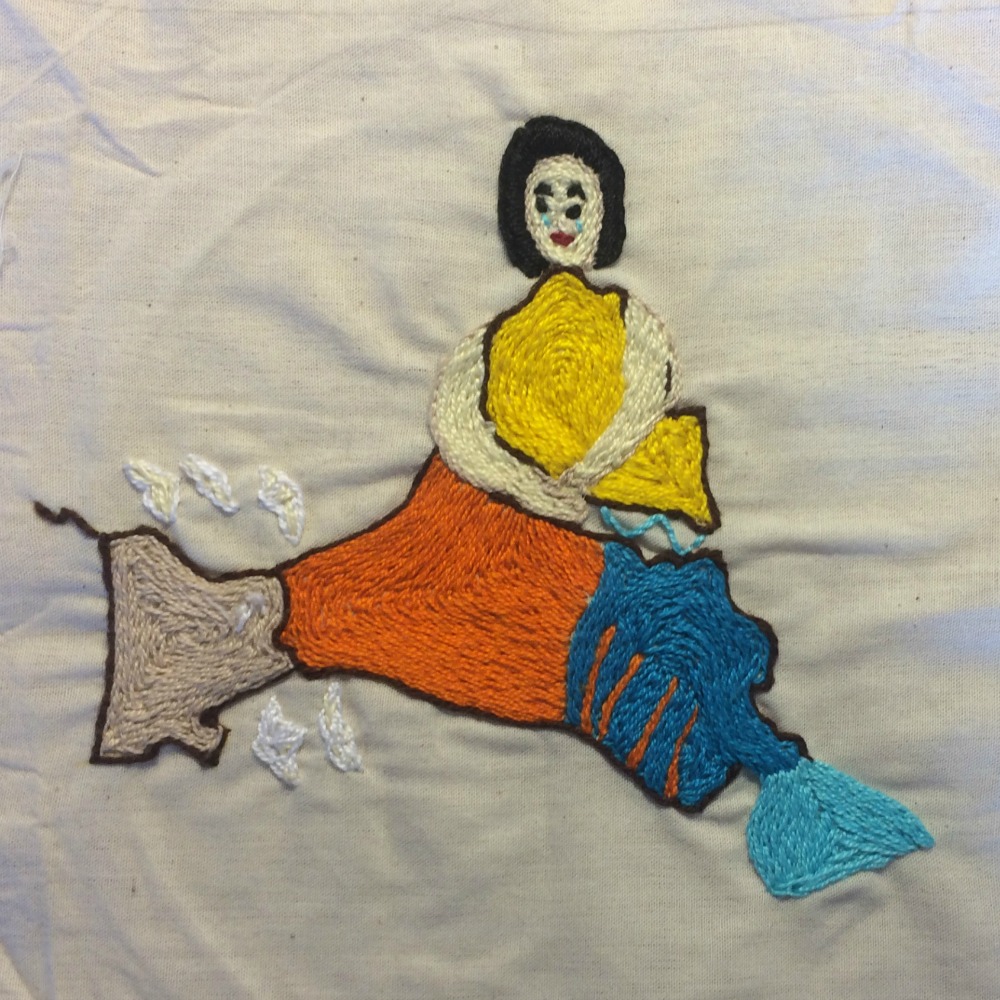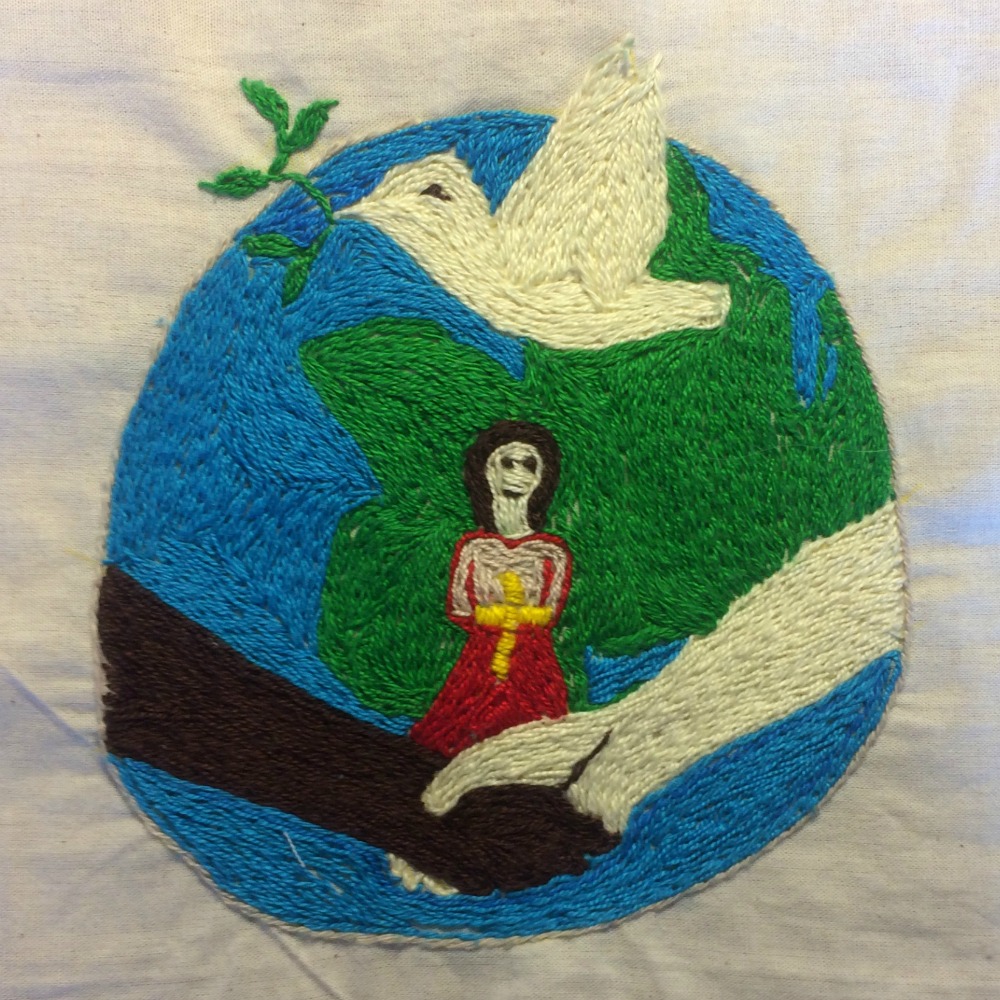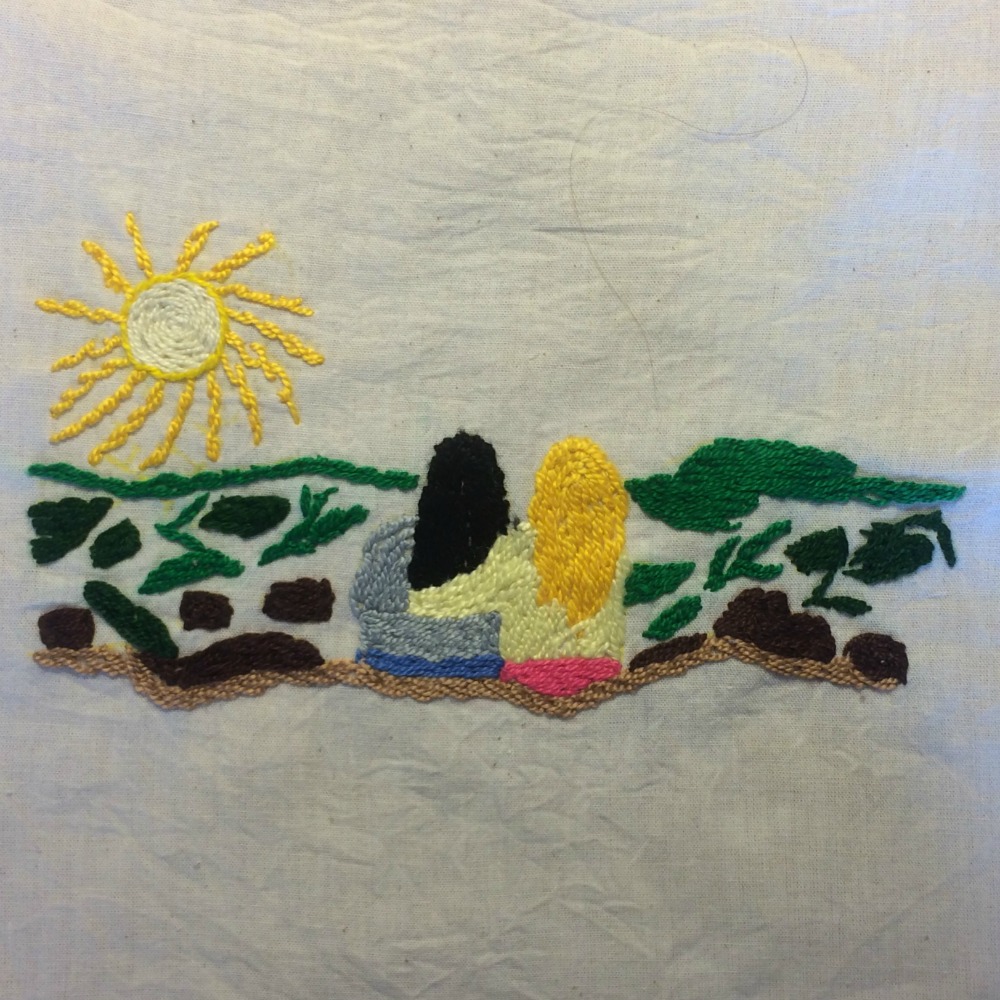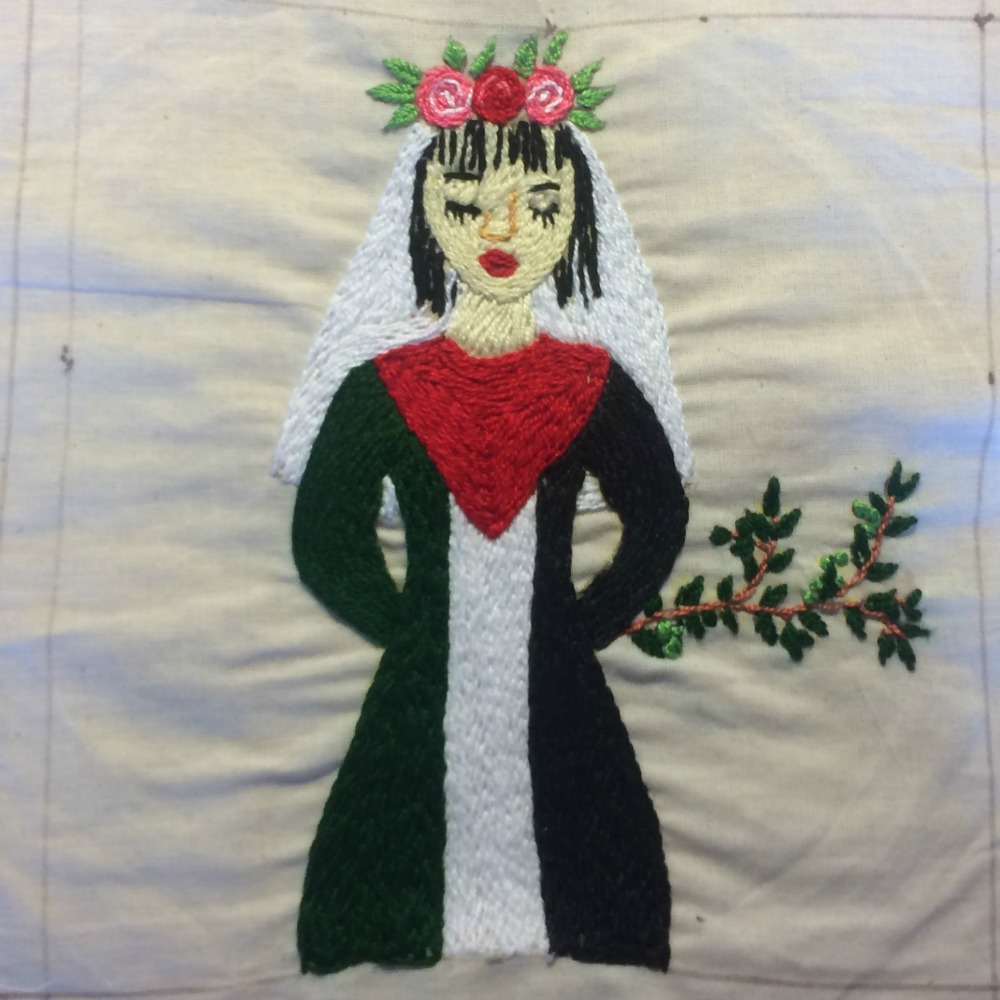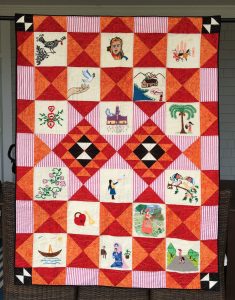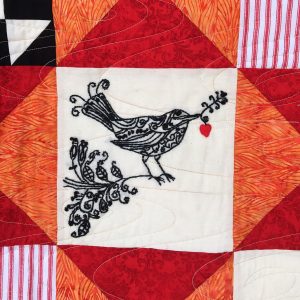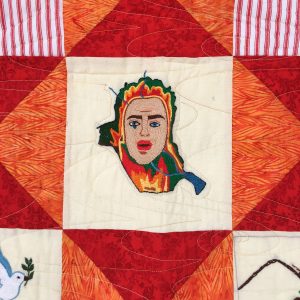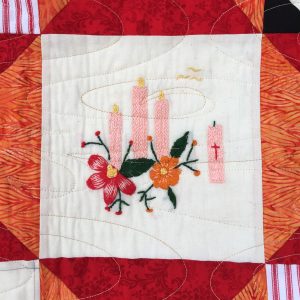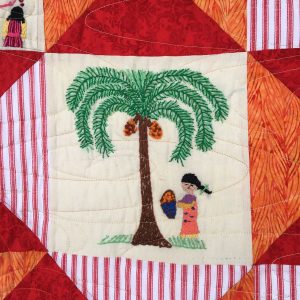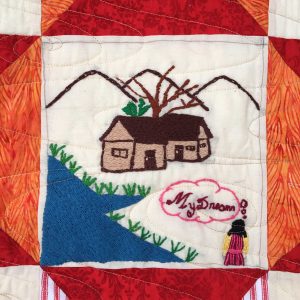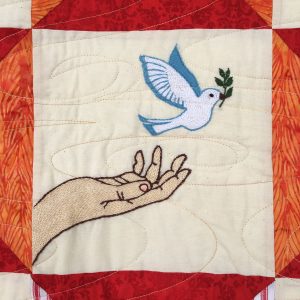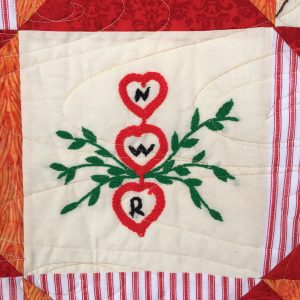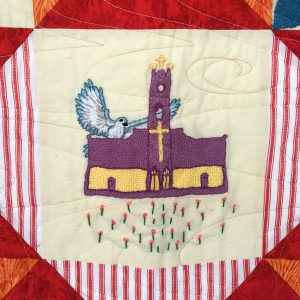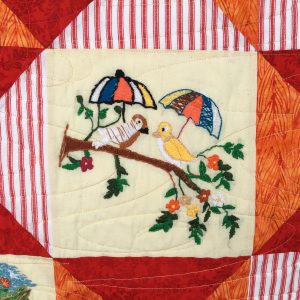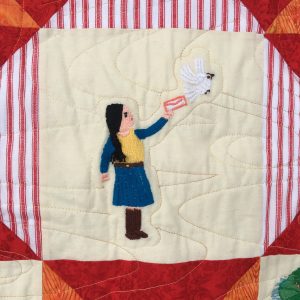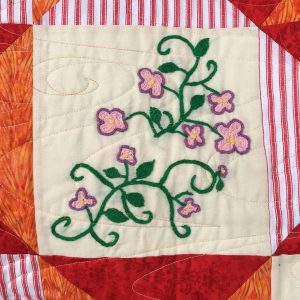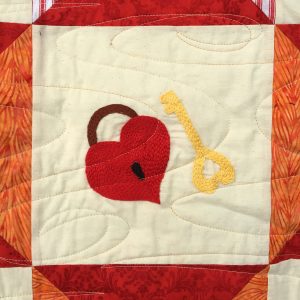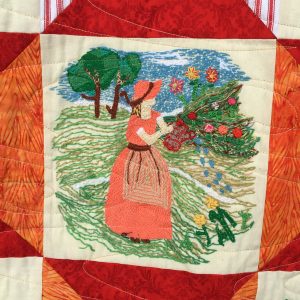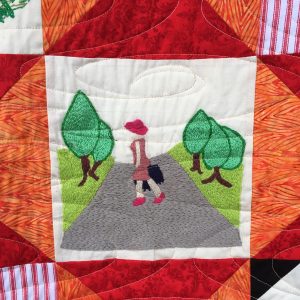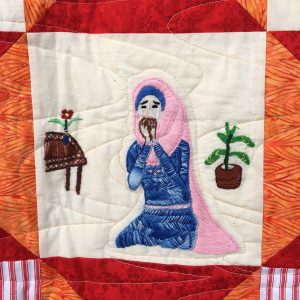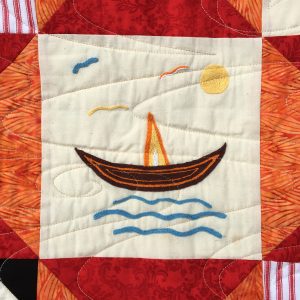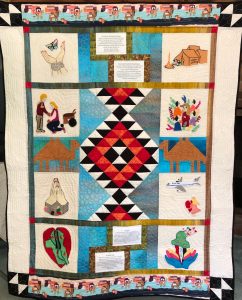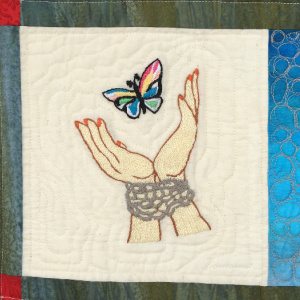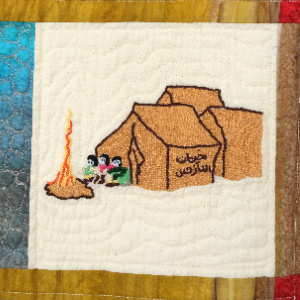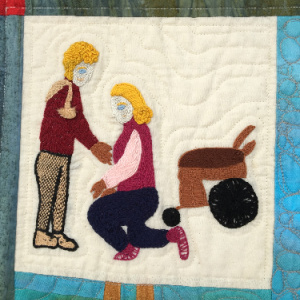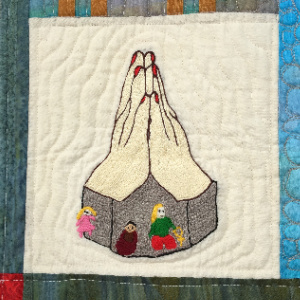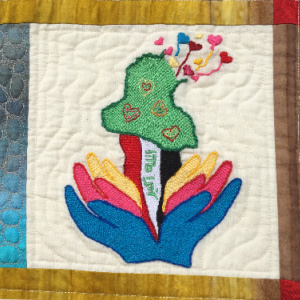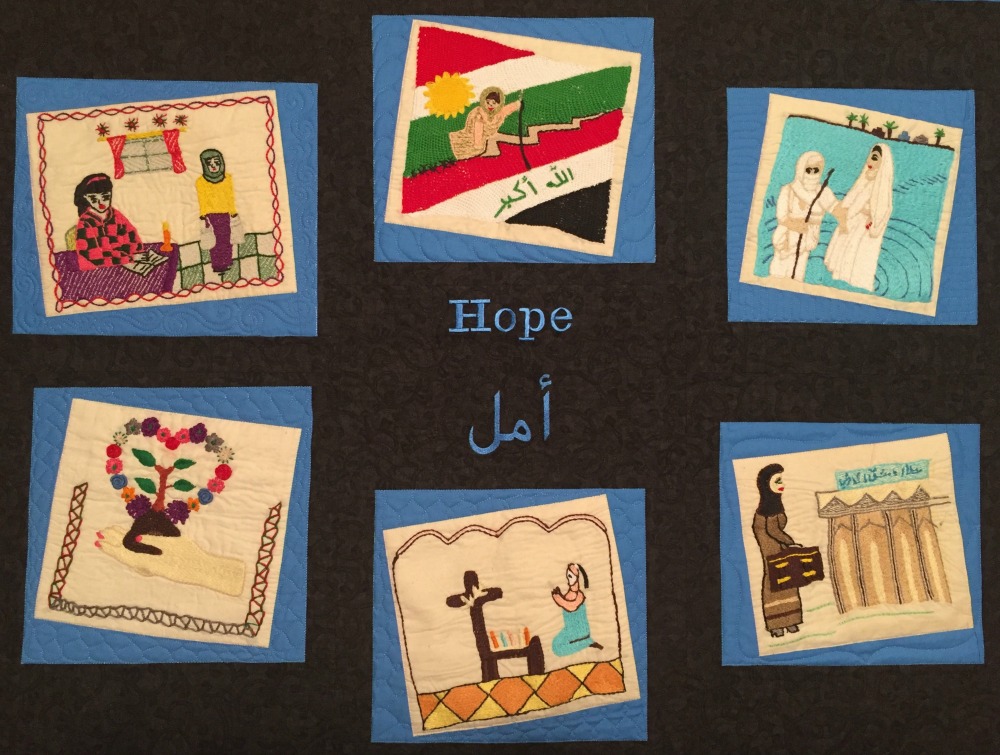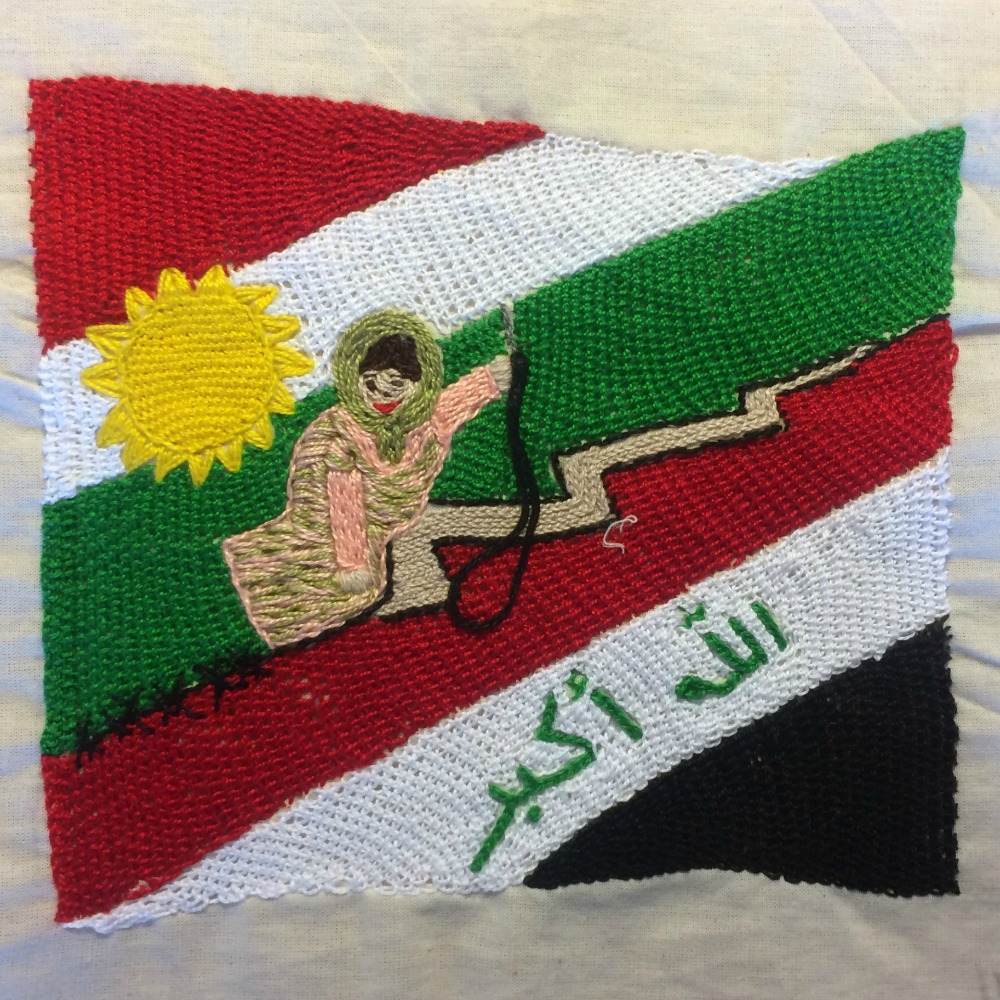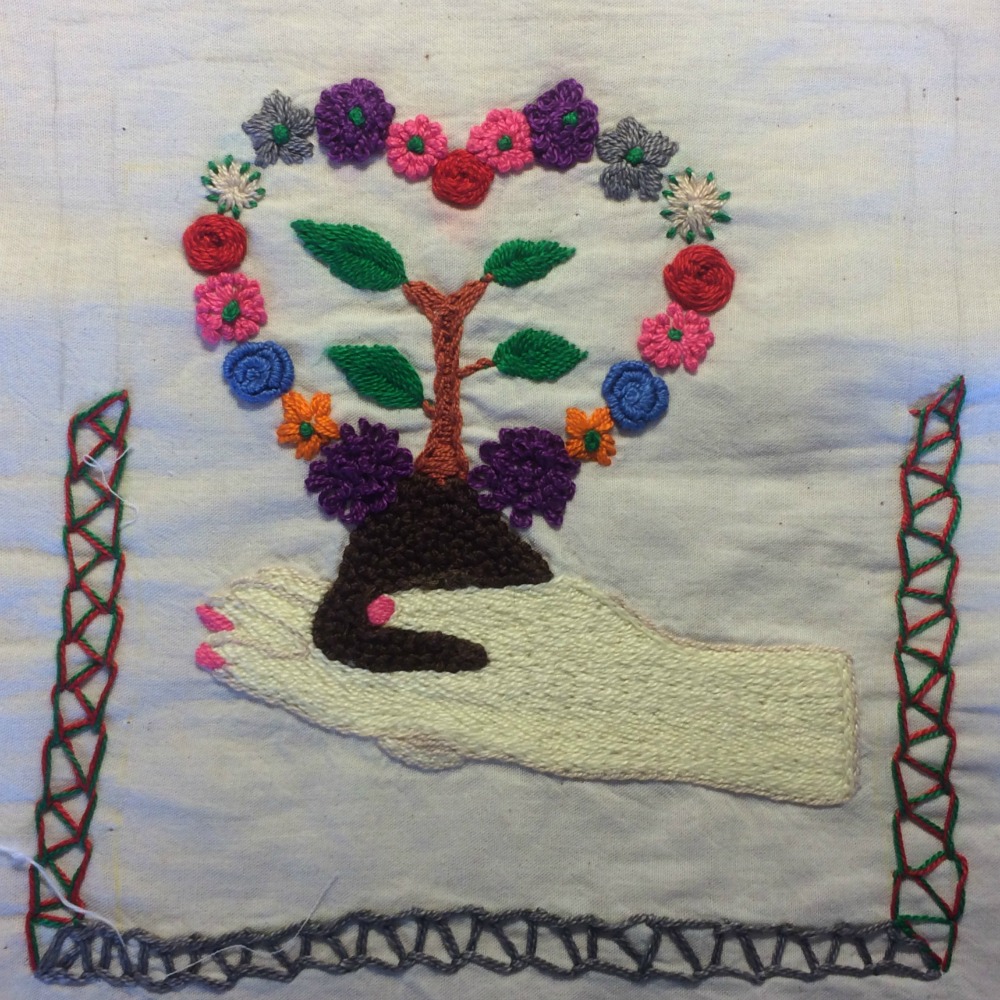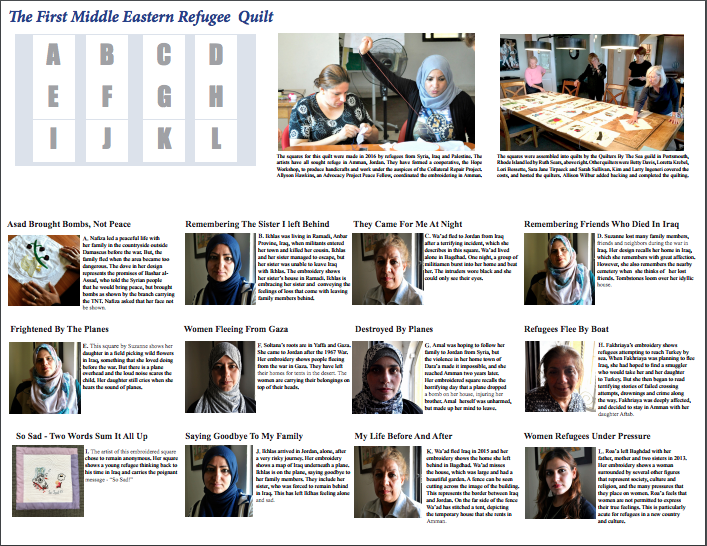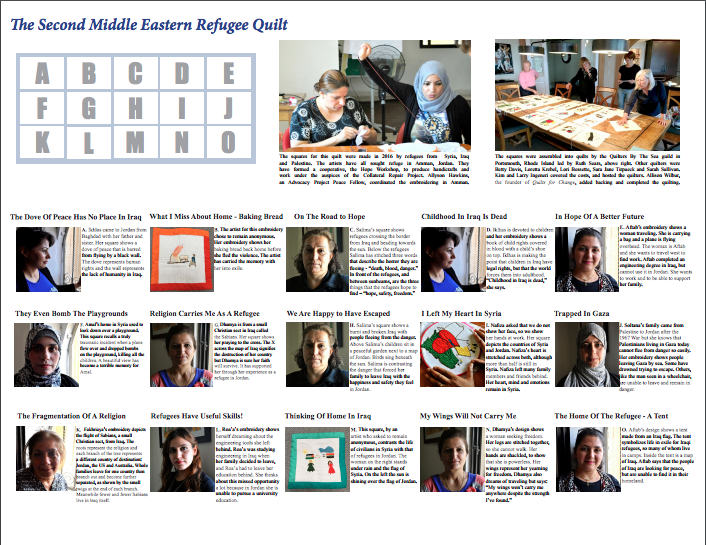Middle Eastern Refugee Quilts
Background
Background
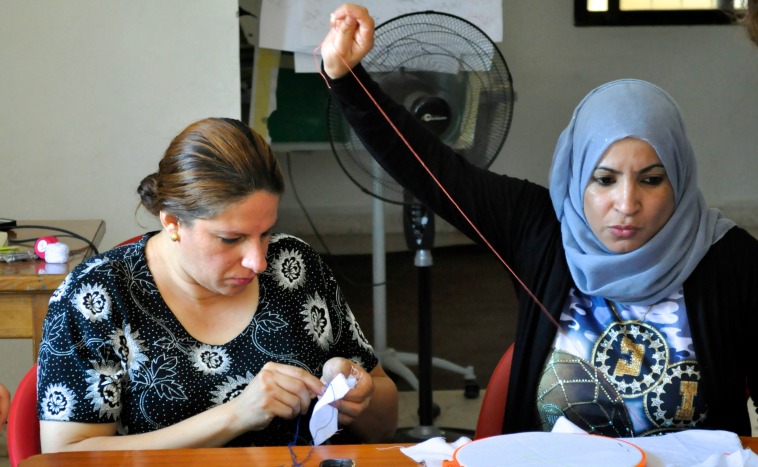 Hard at work: Making embroidered squares at the Hope Workshop.
The six quilts featured in these pages are the product of the worst humanitarian crisis since World War 2. The embroidered squares were produced by 47 women who were exposed to the fury of war in Iraq, Syria and Palestine and sought refuge abroad in Jordan. They left with memories of lost friends, destroyed homes and broken lives. The artists were among hundreds of refugees who have received support from the Collateral Repair Project (CRP) in Amman, Jordan. CRP’s distinctive name is a rebuke to the fact that civilian casualties in war are often dismissed as “collateral damage,” and during several years of dedicated service CRP staff and volunteers in Amman have distributed relief supplies to thousands of refugees from conflict. The supplies include coats and fuel in the winter, fans in the summer, and food during Ramadan. CRP has also provided skills training for refugees, who are not allowed to work in the formal sector in Jordan. These pages are organized as follows. This page tells the story of the project between 2016 and 2020. The second tab carries profiles of the 47 artists. The following six tabs carry photos of the six quilts, the individual squares and a caption where it is available. Tab #7 features the Hope Wall Hanging. The final tab features posters of the first two quilts which can be downloaded for use at exhibitions. How It Began AP began partnering with CRP in 2016. As with other partners, we offered CRP’s stakeholders the chance to describe their experience through advocacy quilts. This was accepted and in June 2016 we selected Allyson Hawkins from the Fletcher School at Tufts University, to serve as a Peace Fellow at the Hope Workshop, an initiative launched by CRP to offer training to refugees. Allyson had interned at CRP and was keen to return. 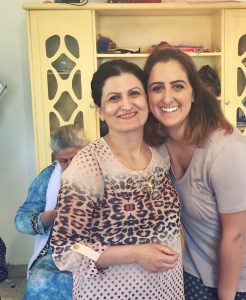 Reina Sultan (right) served at CRP as a Peace Fellow in 2017 and raised over $10,000 for the quilting project. Allyson formed a project team under the supervision of Shatha, who managed the Workshop at the time. Together they added embroidery training to the Workshop curriculum. Twelve women participated, and each produced two powerful blocks describing her journey from war. The following year, 2017, we deployed Reina Sultan as a Peace Fellow to work at CRP and pick up where Allyson had left off. Reina raised over $10,000 for the Workshop and quilting initiative. She also helped to organize embroidery training for a second batch of refugees at the Workshop. The four trainers included two embroidery trainees from 2016. Reina produced several strong blogs, one of which explored the patterns and techniques of traditional stitching. Fifteen new refugee artists took advantage of Reina’s presence and produced another 30 embroidered blocks. Another fifteen artists produced blocks in 2018. It was left to Teresa Perosa, the 2018 Peace Fellow, to collect the blocks, write the profiles and bring the blocks back to the US. Anisa Alawi served as our contact point at the Hope Workshop after Teresa returned. Anisa also helped CRP to use funds raised by Reina to integrate embroidery training into the work of CRP. We were delighted to learn that the Workshop members were making and selling embroidered bags by the end of 2018. “I am a Refugee” Their stitching is among the very best we have seen, and has been praised events where the quilts have been shown. As in past quilt projects, AP did not suggest themes. This was left to the artists. Almost all of the artists decided to depict the horror and violence of the Middle East wars, particularly Syria. Their squares show bombs falling on playgrounds, homes destroyed, and boats crowded with refugees. By 2017, when the second batch of blocks were made, the terror group ISIS was on control across northern Iraq and in Syria, and several of the blocks depict atrocities by ISIS. The fact that this is all portrayed though exquisite craftsmanship makes it more poignant. However, at our suggestion, each artist also produced a second block on a more peaceful theme which would appeal more to prospective buyers As with previous quilting projects, the process of stitching in a group proved therapeutic for the artists and deeply satisfying for our Peace Fellows. Allyson described the process in her blogs. In one early blog she confessed that she felt unqualified to help, given that she did not have “an artistic bone in her body.” But the artists welcomed her advice and she was delighted to see how completely the Workshop members embraced the concept of advocacy quilting. Assembling the Quilts In August 2016 Allyson brought the first blocks back to the US where they were assembled into two quilts by experienced quilters from the Quilters by the Sea guild in Middletown Rhode Island. AP Board member Larry Ingeneri generously covered the cost of material. The quilters met at Larry’s home to decide on a design and assign the squares, and then then met regularly to produce two quilts. This was done by putting strips of fabric (known as sashing) around each bloc and attaching the blocks to backing. The two quilts were then sent to Allison Wilbur, a long-term AP partner and founder of Quilt for Change. Allison added quilting within the squares and more backing. Her subtle patterns bring out the designs beautifully – some even seem to be floating. The 2016 quilts became the First and Second Middle Eastern quilts. The process of quilting the remaining four quilts was spread out over the next three years. The Third quilt was taken on by Bobbi Fitzsimmons, a well-known quilter in North Carolina who has taken on several other advocacy quilts for AP and joined our Board in 2019. Bobbi came up with a dramatically different concept for her quilt. Instead of arranging the blocks in a pattern, she laid them over a background that depicted war and devastated buildings. The shocking nature of the blocks combined with Bobbi’s somber background to make this one of the darkest and most disturbing quilts we have ever commissioned. Bobbi unveiled her quilt for the first time at the annual meeting of her guild in Wilmington, with AP present. The quilt has since been exhibited in Germany, Nairobi and at scores of churches and universities. The fourth quilt represented another important departure from our normal approach. Most of the blocks that remained from 2017 were gentle in nature and described peace. We them to Terese Hartwell, an enhusiastic supported of the Collateral Repair Project and president of the Federation of American Women’s Clubs Overseas (FAWCO). Terese then entrusted the blocks to quilters from FAWCO and its sister organization FAUSA (which serves FAWCO members who return to the US). FAWCO and FAUSA members then proceeded to squeeze as much money for CRP as possible from their blocks. Julia Warner in Dusseldorf Germany assembled six blocks into the Hope Wall Hanging which was auctioned for $1,150 at FAWCO’s annual gala in March. Carol Lalani purchased the hanging and re-gifted it to the annual FAUSA gala in Washington on October 6, where it sold for another $500. Meanwhile, sixteen other squares were assembled into a large quilt by FAUSA members Leslie Nelson and Kay Miller, and raffled off at the FAUSA gala for $3,310. In all, the hanging and quilt raised $4,960 for the refugees in Jordan, as described in this news bulletin. In addition, this entire project created a strong bond of friendship between artists in the Global North and South. This was cemented when Teresa took the first quilt to Amman and showed it at CRP to artists who had made the blocks two years earlier. The Fifth and Sixth refugee quilts were assembled from the 2018 blocks by Merry May in New Jersey, another highly skilled quilter who has participated in several other advocacy quilting projects. Both quilts are brilliantly colored and rely on symmetrical designs, unlike the free-standing design chosen by Bobbi. The quilts were delivered to AP in September 2020. An Assessment 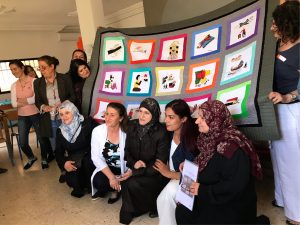 Refugees at CRP had a chance to see how their blocks had been used when the first refugee quilt was taken to Jordan by Terese Hartwell in 2018. The six refugee quilts have produced benefits far beyond what we imagined in 2016. All of the American quilters who worked on these spectacular quilts learned about the Middle East from working on the material and we captured some of their reactions in a short video about the making of the first two quilts. Ruth Sears, who led the quilting, sent a heartfelt note when it was over: “We were honored to find a way to highlight the beautiful work of these women. Each time we worked the conversation turned to their situation. Many thoughts and hopes of support for them.” The quilts have been exhibited at scores of events around the world and allowed thousands of visitors to understand what it means to be a refugee – at a time when refugee protection has been under assault in the US and elsewhere. The quilts have also produced practical result. They have helped to launch a training program at CRP and placed embroidery at the heart of the CRP’s work. CRP has used some of our funding to open a permanent office for the Workshop and hire a trainer. The trainees have developed a handicrafts business.The quilts also inspired the members of FAWCO and FAUSA. Everyone touched by these quilts has emerged with greater understanding and compassion for migrants and refugees. (October 2020). |
I Am a Refugee
I Am a RefugeeThis page profiles the women who have produced blocks for the five Middle Eastern Refugee Quilts. The profiles were written by Peace Fellows Allyson Hawkins, Reina Sultan and Teresa Perosa, with help from CRP staff between 2016 and 2018.
|
“I remember the tombstones in Iraq”
Suzanne came with her family to Jordan Suzanne’s first piece shows her daughter in a field picking wild flowers in Iraq, something that she loved to do before the war began. But there is a plane overhead and the loud noise scared the child. She still cries when she hears the sound of planes. Suzanne lost many family members, friends, and neighbors in the war and her second square recalls her home in Iraq. When she thinks of Iraq she remembers the nearby cemetery. The tombstones loom over her idyllic house. Suzanne says that spending time with other women refugees, learning new skills, and being a member of the Hope collective gives her hope. She also wants her kids to be involved in the community and learn new skills like English, Arabic, and Math, particularly as they cannot attend school in Jordan.
|
“I studied engineering in Iraq and miss my tools”
Roa’a came from Baghdad to Jordan with Roa’a says that she has always been very shy but has gained confidence working on this project. “I became a leader and now I can help other women in the group to become leaders,” she says. Roa’a’s first square shows a woman surrounded by several other figures that represent society, culture, and religion, and the different types of pressure that they place on women. Roa’a says that women are not permitted to express their true feelings. She wanted to highlight this struggle, which is particularly acute for refugees in a new country and culture. Her second square shows Roa’a thinking about her engineering tools. Roa’a was studying engineering in Iraq when her family left and she had to say goodbye to her education. She thinks about this missed opportunity a lot because she is unable to pursue a university education in Jordan. Roa’a and her family are waiting to be re-settled in Australia where she hopes to complete her engineering studies. After learning embroidery, Roa’a hopes to master crochet and get more involved at the CRP community center through training. She feels more hope for the future, and can see herself accomplishing many things. This comes from inside, but she is happy to have found an environment in the Hope Workshop that will build her confidence and teach new skills.
|
“I am proud of my faith. It has supported me as a refugee”
Dhamya came with her family to Jordan When she first joined the Workshop, Dhamya only knew embroidery. She has since learned how to crochet and makes scarves and hats, which brings in a little income and relieves her stress. She has even persuaded her daughter to join. Dhamya’s squares are a form of self-expression, with each color representing a different emotion. Her first square shows her praying to the cross. Dhamya and her family are Sabians, a small Christian sect primarily concentrated around Baghdad that has been particularly affected by violence since the 2003 Invasion. The yellow in her square represents hope. The X across Iraq signifies the destruction of her country. And yet, although Iraq might fall, Dhamya is sure her faith will survive. It has supported through her experience as a refugee in Jordan. Dhamya’s second square depicts “a woman looking for freedom.” The woman’s legs are stitched together, and she cannot walk. Her hands are also shackled to show that she is powerless. The wings represent her desire for freedom. Dhamya’s dream is to travel, “but the wings won’t carry me anywhere despite the new strength I’ve found.” Dhamya says that pressure on the outside can give you energy inside, and that the Hope Workshop offers her an outlet for her energy. Since joining the workshop, she says, she has also learned to become a better communicator. This makes family relationships (which are under a lot of stress due to their status as refugees) much easier. In site of this, Dhamya still fears for her family’s well being. She hopes to be re-settled with her family in Australia.
|
“We left behind death, blood and danger in Iraq”
Salima came to Jordan with her four sons Her brother, an artist, taught her many different skills over the years and she now uses them in the Hope Workshop. Having the space to be creative and productive helps Salima fill her time. Before then she would stay home and kept busy through cooking and cleaning. Now, through the Hope Workshop, her time passes more quickly and she produces beautiful work to sell. Her first design shows a burnt and broken Iraq, with people fleeing from the danger. Above it her children sit in a peaceful garden next to a map of Jordan surrounded by birds beneath the sun. Salima is contrasting the danger that forced her family to leave Iraq with the happiness, hope, and safety they feel in Jordan. Salima’s second image shows refugees crossing a border as they leave Iraq and head towards the sun. Below the refugees she has stitched three words that describe the horror they are fleeing – “death, blood, danger.” In front of the refugees, and between the sunbeams, Salima has stitched the three things they hope to find – “hope, safety, freedom.” Salima’s knowledge of art, and her passion to create, represent huge assets for the Hope Workshop. Her enthusiasm shines through in her work, undiminished by the challenges she has faced.
|
“I had to leave my sister behind”
Ikhlas arrived in Jordan, alone, after an Ikhlas had been keeping her passport safe at a friend’s house in Bagdhad and as soon as they arrived she collected the passport and made arrangements to leave Iraq. But her sister had left her passport behind in Ramadi and was too afraid to return back. Ikhlas made the tough decision to leave Iraq without her sister, who still remains in Baghdad. After she arrived, Ikhlas heard good things about the CRP community center from her neighbors, and decided to start taking English classes. She also attended a women’s leadership training, which encouraged her to join the Hope Workshop. “I like everything about the Workshop – particularly the way it has helped me to become more professional in communicating with others.” She enjoys interacting with people from different countries and cultures and is always busy with a project or activity. “I don’t feel lonely anymore.” Ikhlas’s first square shows a map of Iraq with a plane above it. “I’m on the plane,” she explains. “I’m saying goodbye to family members, including my sister, who I had to leave behind.” Her second square shows Ikhlas and her sister embracing in the garden of her sister’s house in Ramadi, where they once lived. “I still talk to my sister everyday,” says Ikhlas. “But it is not the same as having her here.” Ikhlas says that “everything positive in my life comes from CRP,” and she spends her time at the center trying to forget her problems. But she still wants to travel far away so that she can feel completely safe.
|
“After the bombing, I saw I was in immediate danger”
Amal traveled to Jordan from Dara’a, Syria When the three women finally attempted their journey to Jordan, her mother and sister were denied entry due to incorrect paperwork. Amal continued her journey alone, hoping to be reunited with her children. Amal has always loved handicrafts, and decided to join when she heard of the Hope Workshop. Since becoming a member, Amal has become stronger, gained confidence and learned cooperation skills. Amal’s first design shows her house in flames in Dara’a. Amal and her brother were at home one day when a plane flew overhead and dropped bombs, destroying her home and injuring her brother. Amal realized she was in immediate danger and decided to leave. Her family has moved to nearby village which seems less exposed. Amal’s house used to look down over a playground and her second square recalls a truly traumatic incident when a plane flew over and dropped bombs on the playground, killing all the kids. A beautiful view she once enjoyed is now a terrible memory. Amal’s name means hope in Arabic and she says that this precisely what she now feels. CRP is the only group that has given her assistance and made her feel she has a future. She is overjoyed to be a part of such a generous and tightly knit community.
|
“Some people have drowned while trying to escape”
Soltana’s family came to Jordan after the Soltana learned about CRP through her neighbors. As a Palestinian refugee living in Amman, Soltana decided to get involved. She wanted to meet other women from Iraq and Syria who have gone through a similar experience and she thought that the Workshop would be a great outlet for building new friendships. “They’ve experienced the same misery as the Palestinians,” she says. Before the Workshop, Soltana was shy. She now loves meeting new people: “I have become more outgoing and confident. I can express my feelings better.” Soltana’s first square shows people fleeing Gaza by sea. Some people have drowned trying to escape. Others are unable to leave and remain in danger, like the man in a wheelchair. Her second square shows people fleeing from the war in Gaza. They have left their homes for tents in the desert. The women are carrying their belongings on top of their heads. The Hope Workshop allows Soltana to share these and other stories with her new friends from Syria and Iraq. These cross-cultural friendships give her hope for a brighter future.
|
“We heard terrifying stories of refugees drowning and of crime”
Fakhriaya arrived in Jordan in February Fakhriaya used to make embroidered dresses for her daughter when they lived in Baghdad. “I love embroidery. It feels good to pick up old hobbies in a new place,” she says. She was in a bad way when she arrived in Jordan and recalls that “during the war in Iraq, there was no milk, no bread, our beds were on the floor.” But now she is self-reliant and can support her daughter. Fakhriaya’s first square shows refugees who are attempting to reach Turkey by sea. After arriving to Jordan, Fakhriaya had hoped to find a smuggler who would take her and her daughter to Turkey but she began to read terrifying stories of failed crossing attempts, high drowning rates and crime along the way. She was deeply affected and decided to remain and make a start fresh in Amman. Fakriaya’s second design is more abstract. It depicts the flight of Sabians, a small Christian sect, out of Iraq. The roots represent her Sabian religion, which once flourished in Iraq, while each branch represents a place where Sabian refugees hope to live – Jordan, the United State and Australia. Whole families leave for one country and then branch out and become further separated, as represented by the small twigs at the end of each branch. The number of Sabians in Iraq has fallen sharply because so many have fled from the country Fakhriaya once called home. Being in Jordan gives Fakhriaya hope. “Here, we live in peace,” she says. She is no longer afraid for herself and her daughter.
|
“I have an engineering degree but cannot use it in Jordan”
Aftab came to Jordan from Iraq with her Since joining the Workshop Aftab has learned about cooperation and making handicrafts. She is particularly talented at embroidery and her first design shows a tent made from an Iraqi flag. She chose this design because it depicts the reality for the many Iraqis who are refugees. Aftab explains that the people of Iraq are looking for peace, but are unable to find it in their homeland. Aftab’s second square shows a woman traveling with a bag. A plane is flying overhead. The woman is Aftab and she wants to travel west to find work. Aftab completed an engineering degree in Iraq, but is unable to put it to use in Jordan. She wants to work and to be able to support her family. It gives Aftab hope to meet new people and build new relationships at CRP. She is encouraged when she sees people smile, and has a strong sense of belonging. She also feels less lonely.
|
“Childhood in Iraq is dead”
Ikhlas came to Jordan from Baghdad with The first day Ikhlas came to the center, she met Shatha, the Hope Workshop coordinator, and felt immediately comfortable talking with her. “The stress of being a refugee melted away. When I’m at CRP I feel comfortable.” Ikhlas is an enthusiastic participant in all the CRP activities. She loves handicrafts, and particularly enjoyed the embroidery project because it draws on real life. “It’s a chance to share our experiences with others,” she says. Ikhlas was a lawyer in Iraq. She loves her profession, and says the Hope Workshop gives all the women the opportunity to talk about their old lives, their professions, and their studies in a safe and encouraging way. A passionate defender of human rights, Ikhlas says that the protection afforded to Iraqi citizens by law “only exists on paper” and does not translate to real life. This is particularly true for children. Ikhlas’s first design shows a book of children’s rights covered in blood with a child’s shoe on its top. “Children in Iraq have legal rights,” she says. But “the world forces them into adulthood. Childhood in Iraq is dead.” Ikhlas’ second picture shows a dove of peace that is barred from flying by a black wall. The dove represents human rights and the wall represents the lack of humanity in Iraq. Since coming to Jordan Ikhlas has felt safe, happy, and full of hope. Here she can live in peace and leave her home without fear. Still, she says, “Jordan is a station – a stop on my way to another country.”
|
“A piece of my heart is still in Syria”
Nafiza has asked that we do not show her Before Nafiza came to Jordan in August 2012 she had lived a peaceful life in the countryside outside Damascus with her family. They had to flee when the area became too dangerous. They traveled to Irbid first but her husband was unable to find work. They then moved to Sahab, where her husband found modest work in a mattress factory. However, he became sick and could no longer work. It was then that they made the move to Amman, hoping to better support the family. In Amman, they reunited with a friend they had known in Syria who now worked at CRP. He connected Nafiza to the CRP community center where she learned about the Hope Workshop. Nafiza brought some of her previous embroidery and crochet work with her to a Workshop meeting and was immediately welcomed as a new member. She has attended several gender trainings and become very interested in gender and relationships. Nafiza’s first picture is of a dove. She says the dove represents the promises of Bashar al-Assad, who told the people he would build peace in Syria but brought bombs not peace. The branch carries the letters TNT. Nafiza’s second square depicts Syria and Jordan. Her heart is stretched across both countries, because she left many family members and friends behind and her thoughts are still with them. A big piece of her heart remains in Syria. Nafiza’s family has a different status from the families of the other women because her husband has Jordanian as well as Syrian nationality. But Nafiza is the only member of her immediate family who is registered with UNHCR. This adds to her sense of being stuck between Syria and Jordan. Before joining Hope Workshop, Nafiza said she felt “helpless and weak.” But now, participating in the activities with other women has made her feel stronger. She fervently hopes that her family can become more integrated and forget the heartache they experienced in Syria.
|
“It’s hard to explain what the war did to me…”
Sena arrived in Jordan in 2014, with the remaining members of her family after her only son was tortured and killed by government military forces. Sena’s husband was also snatched off the street on his way from work one day. He was also tortured and imprisoned. She remembers crying all the time after her son died, she couldn’t eat or sleep. She was afraid to go out, so she had no choice but to stay at home and wait for her husband to return. After he was released, Sena decided to leave Syria. She moved from one place to the next, but she still remembers the sounds of gunfire, bombs and seeing dead bodies on the streets, “It’s hard to explain what the war did to me, psychologically. I was in a really bad place.” Before she joined the embroidery group six months ago, Sena was unhappy and depressed. She explains that she spent most of her time at home alone with nothing to do, but since joining Hope Workshop her mental health has improved, “[..]the group supports me, it gives me psychological support. I’m happy to meet new people, but now I see a big difference.” She has also developed her technique and drawing skills. Sena is talented in embroidery and learned to stitch from her mother and grandmother. She used to embroider on clothes and scarves for people back home in Syria. She says that stitching allows her to tell her story, and she is able to pour everything she feels into it. She chose to draw a prison in Syria reflecting on the pain of losing her son. Sena also explains that her life resembles a prison, “I feel like my life is a prison because I can’t go anyway. I can’t visit my son’s grave or be with the people I love. I feel like my life is a trap. I am trapped.” Sena’s second square is a map of the world with Syria at the center. She explains that even though she has lost everything, she hopes one day that she can return to a new Syria, ‘the sun is shining on Syria. The sun is a good sign because it means that there’s still hope,” she says
|
“…I can put all my sorrow and pain into the square. It’s like the pain is leaving my body.”
Farah was a housewife and always made sure to provide the best life for her four children. In 2015, Farah left Syria with her two daughters and husband with nothing but the clothes on her back. She remembers bombs going off near her house, “I feared for my family and their safety. I was afraid one day my sons and husband wouldn’t come home,” so that’s why she had to leave. She tells the story of what it felt like going from city to city until they reached the Jordanian border. She shows me a picture of how she looked like before the war started, and she points to it, “[…] see how young I look and look at me now. Every time I talked to my friends and family back home, they say that I look old and that I don’t look beautiful anymore,” and she starts crying. She joined the embroidery group five months ago. Before she was always at home in the dark alone with her thoughts. Since she joined the group she felt like she had achieved something meaningful, “I like the idea of drawing and expressing my feelings. It has helped me in many different ways, like I can put all my sorrow and pain into the square. It’s like the pain is leaving my body.” It made her useful and allowed her to focus on something then just staying at home. Farah learned how to stitch from her mother. She would embroider on dresses for children. She didn’t know how to do complicated stitches like the Jordanian stitch when she first joined the group, but she enjoys it now. She loves designing and wants to learn to stitch more beautiful patterns. The first square she drew reflects on her hometown being destroyed by bombs. She watched as bombs were dropped on their neighbors, “It was a horrible thing to watch, and I saw it with my own eyes.” The second square is what she continues to hope and dream about everyday since the start of the war. She’s just arrived at the Damascus airport after spending many years in a different country, “It’s a dream of mine to return to Syria, I can never put it out of my mind.” She hopes that she can improve her skill so she can sell products at bazaars in Amman. Farah did not want her photo taken.
|
“I love to challenge myself and learn new things that I haven’t tried before in Iraq.”
Salma is a Christian from the city of Qaraqosh near Mosul, Iraq. She played on the national women’s football team for three years. She also played in Germany, but returned to Iraq to get married. She was studying to become a beautician when ISIS attacked her town forcing her family to flee to avoid persecution. She lived in Irbid for a short period of time before relocating to Jordan in 2015. She is a practicing Christian and attends church in Jordan with her family. She also spends her time there learning different craft skills, which she enjoys, “I love to challenge myself and learn new things that I haven’t tried before in Iraq.” In her free time, Salma make clothes for her newborn son. She embroiders on quilts and makes traditional Iraqi clothing. When she was just a child her mother gave her a piece of fabric and told her to embroidery, “she just gave me the fabric and told me to go stitch!” She uses traditional bright colours because it makes all the beautiful details of Iraqi stitch stand out. She founds the Jordanian stitch beautiful and hard, but is determined to perfect it, “I still want to learn about to make clean lines on the back of the stitch. I still can’t do that.” If she is resettled in Canada or Australia, she wants to get her beautician certification and open her own salon.
|
“I feel like I lost myself taking care my family. I cannot live the life I want.”
Fatema is from Al Quds, Palestine and has lived in Jordan for nearly 20 years as a refugee. She had a good childhood, she always played outside and just enjoyed being a child, but she is now taking care of her family because they are all sick. She never had the opportunity to go to school, “I feel like I lost myself taking care my family. I cannot live the life I want.” Fatema suffers from depression and anxiety, but joined the embroidery group to take a break from taking care of her family, and make new friends. She also takes part in different activities at CRP, such as acupuncture. Fatema had no formal training and learned the Iraqi stitch from Huda, a trainer in the embroidery group.
|
…she was threatened by ISIS for being a non-practising Muslim and not wearing a headscarf.
Sabeen is from Mosul, Iraq and for 26 years she worked as a baker in a restaurant. She made bread, pastries and other traditional Iraqi sweets, and spent the rest of her time taking care of her family. She has a daughter who still lives in Iraq studying at university. She fled Qaraqosh with her husband when she was threatened by ISIS for being a non-practising Muslim and not wearing a headscarf. She moved from city to city trying to escape ISIS with husband, and she was forced to leave her daughter behind in Irbid. She is now taking care of her disabled husband and grandson. She also has a hard time finding work to pay for her husband’s medical bills. Sabeen joined the embroidery group in a four months ago, she is eager to learn the Jordanian stitch in the next few months. Sabeen’s first drawing is an image of her daughter standing outside the Iraqi airport. She left her daughter behind in Iraq and is hoping to reunite with her one day. She hopes to be resettled in France or anywhere else. She doesn’t have family outside of Iraq, but only wants to feel safe once again.
|
“…they are my family away from home.”
Mina worked in a salon in Iraq for 7 years before she was forced to flee Iraq. She had to leave her friends behind in her hometown of Qaraqosh. She relocated to Jordan with her husband and four children, and works in a salon to support her family. She taught herself how to embroidery at a young age, and encouraged her children to learn as well. She enjoys coming to the embroidery workshop because of the friendship and company, “[…] they are my family away from home.” Mina hopes to resettle in Australia with her family. She also wants to open a salon and in her free time continue embroidering because it gives her a sense of peace, and she says it’s very relaxing.
|
“I want to be legal person [resident] and not a refugee anymore.”
Noor was born and raised in Baghdad, Iraq. She worked as a nurse in a hospital, and her husband is a doctor. She loved her job and co-workers, “When they take photos they always send me a text message saying, ‘We wish you were here, we saved a space for you in the photo.” She stayed in Iraq during the war to take care of her sick father-in-law, and left when he died. Noor’s house was burned down and she was not allowed to return to Qaraqosh, so she left Iraq with her husband, “There was not future in Iraq. It was not safe for us anymore.” She came to CRP a year ago and joined the embroidery workshop last summer. She had no idea how to embroider, but learned it from one of the other members in the group. Noor hates being labelled as a refugee, and living like one in Jordan, “I want to be legal person [resident] and not a refugee anymore.” If she is given a chance she wants to work as a nurse again, but she also wants to own her own house and wants everyone she loves all in one place.
|
“In Australia, they could go to school and be free.”
Originally, Ashwaq’s parents came to Jordan. Once they left, she began to question what she even had in Iraq. They told her that her children would not be bothered the way they were in Iraq and that life was nicer in Amman. They felt safe. Ashwaq told her husband she had made up her mind; she would go to Jordan with or without him. But he felt that they didn’t have a community left in Iraq, so he decided to come with her. Ashwaq’s parents were resettled in Australia two or three months after she arrived in Amman. At first, she was sad that they had convinced her to come and then left, but she is happy they can relax now. Overall, Amman is better. There is safety and security that Ashwaq and her family didn’t have in Iraq. She says she can dress how she likes and so can her children. However, her husband left his work behind in Iraq and Jordanian law doesn’t allow Iraqis to work. He tried to find work anyway, but he couldn’t. Ashwaq and her husband applied to go to Australia to be with her parents but they were rejected. They are trying again because she doesn’t know anyone else in Canada or Europe, where the UN suggested they try. It’s not just her parents there; she has uncles and cousins in Australia also. There is a big community of Sabaeans where her parents live. “Here, we celebrate holidays at home. We don’t have family to visit, but in Australia we could go celebrate with family,” Ashwaq elaborates. Ashwaq’s children have a hard time with school here in Amman. They started, but she was scared for them so she pulled them out. She put them in the Kids Club at CRP, but her older son doesn’t want to be with the younger kids. He says he wants to go to real school with students his own age. She says she would be thrilled for her children if they were resettled in Australia because they did not have a real childhood. “In Australia, they could go to school and be free.
|
“Notice us. Let us in. If we go back to Iraq, they’ll kill us.”
Ebtisam recalls, “We fled Daesh 7 minutes to midnight. We went to Anqawa.” She and her family stayed in Anqawa for almost a month before she came to Amman. She says she is waiting to be resettled as her house in Iraq has been looted and vandalized. She has been in Amman with her husband and her unmarried son for 3 years. The rest of her family is split up all over the world. She has a son in Germany with two daughters. She has a daughter in France who has two children and another daughter who was recently resettled in Australia with her two kids. She’s never met her son’s children, as he has been in Germany for 6 years. Ebtisam hopes to be resettled in Australia to be closer to her daughter and grandchildren, or Canada, from which it will be easier for her to visit her family, but hasn’t heard back from either about her application. She began her application to go to Australia nearly two years ago and never received word about an interview with the Canadian resettlement agency. Ebtisam says that her family is tired down to their bones. When asked to directly address the west, she implored, “Notice us. Let us in. If we go back to Iraq, they’ll kill us.”
|
“Anywhere that we could be accepted, we would have relatives that we don’t have here”
Haneen was a teacher in Iraq. She decided to leave when she saw the state of her country and her students deteriorating. They originally wanted to come to Jordan, but it was deemed too hard. Turkey’s process was faster, so she and her family headed there. Haneen said it was difficult to send her children to school because it was all in Turkish. She had a difficult stay in Jordan, where she didn’t have any relatives in Turkey and the language was so hard. Despite the hardship, they stayed there a year and 10 months, but eventually, they came to Jordan. Here in Jordan is still hard because they don’t have work. Neither Haneen nor her husband can support the family without work, but luckily, she enrolled her children in the kids’ programs at CRP. They want to be resettled anywhere that will take them. Haneen’s sister was accepted into Australia in 2016 and her husband’s brother has been in America since 2015. She has siblings in Sweden as well. “Anywhere that we could be accepted, we would have relatives that we don’t have here,” says Haneen.
|
“We went to Aqrah, we weren’t relaxed. We went to Irbil, we weren’t relaxed. We left to Amman and it’s the same thing.”
Jenan is from Mosul. She says everyone from there has the same story. They fled from Daesh on August 6th, 2014. The first thing they did when they left was go to Aqrah, Iraq in Kurdistan. Jenan has 8 children, 5 girls and 3 boys. She recounts that the children got bored in Aqrah. They were used to going out and socializing or going to church. They eventually moved to Irbil and the family knew everyone in the community, in the churches. Jenan and her family rented a house there and waited for Daesh to leave Mosul. She went back and saw her area and it was unlivable. Daesh had sacked and destroyed homes, so they went to Amman. She feels as though she can’t relax because she isn’t at home. She elaborates, “We went to Aqrah, we weren’t relaxed. We went to Irbil, we weren’t relaxed. We left to Amman and it’s the same thing.” There is no work and the rent is very high according to Jenan. When you don’t have a job, everything seems expensive she says. Jenan pleads, “We are asking God to make this easier on us, those who left before us, and those who left after us. We hope those who want to be resettled get resettled and those who want to return can return. I just want to repeat, we weren’t at ease there and we’re not at ease here.”
|
|
“God willing, we will get accepted.”
Wee’m was a teacher from Al Amarah, Iraq. Her family got tired of the violence, so they decided to leave. They went to Baghdad, where they stayed for a while before coming to Jordan in 2016. “Thank God, we can feel more relaxed here,” says Wee’m. However, in terms of jobs she is just sitting and waiting. She can’t work, which is hard because her mom is sick. Wee’m doesn’t receive any aid to pay for her mother’s medications and she is getting worse. She hasn’t been able to get up for the past 10 days, which has left Wee’m very nervous. Plus, her younger brother is a young kid and she worries about him. She doesn’t like to have him out of the house too much. Wee’m is happy to start at the Hope Workshop because she has sewn her whole life and hopes to help her family. She has relatives in Australia and has begun the resettlement process. “God willing, we will get accepted.”
|
Laylah hopes to resettle and continue working with children with disabilities.
Laylah, 43, is from a Iraqi-Assyrian community. She worked in a centre for physically disabled children for 15 years before deciding to stay home to take care of her children. She fled Iraq with her family before it got worse to Amman in October 2017. In Jordan, refugees are not allowed to work, Laylah and her husband have found other ways to support themselves. She currently home schools her children because she cannot afford the school fees. Laylah comes from an artistic family–painters and embroiderers. She explains that Iraqi-Assyrian embroidery is more intricate and embellished, “a lot of people don’t know that Iraqi-Assyrian has a whole different culture, heritage, language separate from the rest of Iraq.” She joined Hope Workshop to meet new people, and give in anyway she can, “I can’t work but at least I can do something important and contribute in some way.” Laylah says it is important for her to keep busy and stay active. Laylah hopes to resettle in either America or Australia, and continue her work with children with disabilities. She also hopes that the conflict in Iraq will end, so she can return home someday.
|
Jowhara loved teaching.
Jowhara, 45, is from Baghdad, Iraq. She taught mathematics for ten years before becoming a headmistress at the same school. She really loved being a teacher, organizing, planning lessons and interacting with her students. Jowhara and her family spent months moving from one town to the next before arriving in Jordan. She says her first priority is the safety of her family, but she also says, “what they don’t tell you is how hard is going to be [relocating to a new country]. What I suffered in Iraq, is different what if I suffer here [Jordan].” Jowhara loved her job as a teacher, but she does not want to return home because it’s not what it used to be, “the people I loved [friends and neighbours] are the same ones that turned their back on me.” The reason she joined HWJ was to practice on her embroidery skills because she didn’t get the chance back in Iraq because of her workload, but “it HWJ has opened its doors to me. It saved me from loneliness and depression. It allows us to participate in a meaningful way.” Jowhara hopes to resettles in the USA and reunite with her son and grandson.
|
“If I had the chance I would work…”
Lubna is Mosul, Iraq. She is 37 years-old and has three children. She is a stay-at-home mother, and her husband worked as a butcher. She had a good life in Iraq, raising cattle, growing vegetables and selling them in local markets, but everything changed overnight. ISIS invaded her town, repossessed her farm and destroyed their properties. Lubna and her family were forced to leave for Erbil then to Aqrah in Iraq. For two years, they moved from one place to the next to avoid being capture by ISIS.
In 2016, they arrived in Jordan. Lubna and her family have a difficult time adjusting to life in Jordan. Even though refugees aren’t allowed to work, Lubna’s husband managed to find a work, but “if I had the chance I would work to help my family,” says Lubna. If she is resettled in Australia, Lubna wants to work as a professional stylist in a beauty salon.
|
“It was the scariest thing in my life.”
Nura is 29 year-old, mother of three children from Mosul, Iraq. She fled the war because of ISIS, and she and her family lived in their car for months trying to escape the violence. One day, Nura and her husband decided paid a human smuggler to take them to Greece in a boat. They spent two weeks on a boat before it capsized. Luckily, she and her family survived, “it was the scariest thing in my life because everything was dark. People were screaming and my children were crying.” After two long days being stranded on an island, Nura and others were rescued by police, however, they sent on a boat back to Iraq. Nura says, “some people tried a second time and were successful, but we could make the journey and risk losing my children, so we had to find another way.” Nura returned to her hometown because ISIS had left at that point, but the entire town was burnt down and they wasn’t anybody left. Nura finds Jordan expensive and struggles to purchase food and pay for household bills. She spends her time sewing clothes and uniforms for friends and customers, but it is not a stable income, “I depend on the money I make from sewing, but it not enough. I cannot support my family on 3jd a day.” Nura is hopeful that she’ll get a chance to start a new life in a safe country. She hopes to resettle in Australia with her family.
|
“I want to live a stable and a safe life.”
Daniela: “I’m from Mosul, in Iraq. I came to Jordan with my two boys and my husband. It has been over a year. The rest of family traveled to other places, so we are all separated. We left Mosul because Isis got into the city. We faced them for a while, but they harassed us so much to the point of physical violence. We became tired in Iraq and decided to come to Jordan, it was time. There was nothing for us in Iraq. It was difficult to bear the sadness and injustice. We came to Jordan because it was safe and stable for refugees to come here. I have been here for three years. I love Jordan. If people start to talk ill about Jordan in front of me, I never accept it. But we don’t have means to make a living. Now my family wants to travel. We have been rejected multiple times. It has been hard and we are tired. I just hope my voice is able to reach people because there are no opportunities or options for us to return to Iraq. My home and the things that I used to call home in Iraq were destroyed. There is nothing to return to. I wish to live in a place that has stability, where people are apologetic and sympathetic to other people, a place where my children can go to school, and where I can build a loving home. The only thing we need help right now is to be able to travel, the rest will be up to us. We are not asking for anything else, we are asking for the opportunity to create a life for ourselves. I’m really happy I got to participate in Hope Workshop because working with embroidery gave me a hope that I didn’t have before, I had my hope renewed. I was a science teacher in Iraq, so I really love to work. I’m happy that I got to meet all the ladies and to work with the people here. For the future, I hope Iraq will be safe, that we are able to travel and that my kids are able to go to school. I want to live a stable and a safe life.”
|
“God willing, I will see Baghdad again.”
Ameera: “I was born in Baghdad. I have seven kids, four girls and three boys. We have always lived in Baghdad. Life was really good, we had a food store, it was successful. My favorite dishes to make are kubbeh, biryani and douma. The problems started in 2013. We first left Baghdad and we went to Qaraqosh. Then, things got more complicated, and we left for Erbil, in the North. When it was clear that the situation was not going to change, we decided to leave Iraq and our store, and come to Jordan. We left Iraq because there was not safety. And we have been here since 2016. I like Jordan, I like Amman like I like Baghdad, I feel relaxed here. Obviously, there are problems, but in general, I feel very relaxed here and I enjoy Jordan. When I was in Iraq, I was suffering a lot of physical and psychological pressure. Since I came to Jordan, all those things went away. This is why I feel relaxed. But Jordan is just a stop, we are going to Australia. I have a big part of my family already there and one of my daughters. My family there helps us with money, we get help from them because we cannot work here. I really like Hope Workshop. My personality is not really to mix with people too much, or be too social, but I felt that here I had to do those things, and it was good, I liked it. For my square, I did an Iraqi woman looking at her country, and crying because she is seeing what is happening there. But at the same time, she has hope. So one eye has a tear and the other one doesn’t, the other one is looking ahead a little bit. There is the fire, the problems that are happening now and the reality, but there is still hope. Of course, one day, I want to go back to Baghdad, it is where I love. It is the kind of city that opens your heart. All of my children were born there. I was born there. Last time I was there was in 2014 to get passports. God willing, I will see Baghdad again.”
|
“We are all just people.”
Sawsan: “I’m from Mosul, in Iraq. I’m here with my two daughters, Gardenia and Rose. I really love flowers, that is why I named them like that. I have been living in Jordan for two years now. Life was bad in Mosul. My husband was a pharmacist. He was killed in 2005 because we are Christian. So I took my daughters. We left our home and all our belongings in Mosul after my husband died and we went to the north of Iraq. But then in 2014, Isis expanded, they were very close to where we were living and we decided it was not safe, so we came to Jordan. I like Jordan, how could I not like the country which accepted me and welcomed me? People are kind and respectful, there is nothing not to like. We can’t work here, but I have been taking classes, on computer science and IT. I brought the money that I had from Iraq. My brother helps me also. I learned about Hope Workshop because I used to come here to CRP to hang out, looking for work, and then I heard about it. So I signed up and I liked it. I like to have friends and see them, I like the work. Me and my daughters, we hope to go to Australia now. My brother is there already with his family. Australia is a democratic country, is a country that prides itself on the acceptance and diversity and on not discriminating people based on how they look or the religion that they have. There is no reason for people to be unloving towards each other. We are all just people. In Mosul, there is a lot of division because of religion. There is a lot of diversity but also a lot of problems. So how can I return to a place where people don’t respect other people? Are we not part of that land? Christians are an essential part of Iraq, we own that land, we have been there for a very long time. If you are forced out from the place where you are originally from, my whole history is in this place, how can I go back? For my square, I wanted to represent me and my two daughters, so I did three candles, representing light. The extinguished candle is my husband. And the birds are me and my daughters flying to Australia. For the future, I want to go to Australia and for my daughters to study. I want my daughters to do well, to go to university. I hope Australia continues to help people who need it. But in general, my hope is that it is a place that they help people who are going through difficulties or poverty. And that Iraq is able to improve and become a better place.”
|
“My hope is that I reach my goals.”
Noor: “I’m from Mosul, in Iraq. I arrived in Jordan in 2016. I have four children, three girls and one boy, and my husband. Isis entered Mosul, so we left in 2014 for Erbil, in Kurdistan. We discovered our house was destroyed. We decided there was nothing for us in Mosul so we came to Jordan. I have people back home still. I have one brother in Iraq. My other siblings left. One is in France, two in Australia, one is here, one passed away, and one is Lebanon. Life in Mosul was nice. I used to sew at home, my husband was a construction worker. We never thought about leaving, we never considered leaving. In Iraq, you are living with your relatives around, you are surrounded by people you know. It is not that the situation is particularly good, people have problems with water and electricity, but it is still your home, where we are from. But I don’t think about coming back anymore, there is nothing to return to. I like Jordan, but it is not like Iraq. There is no work here. My husband’s parents help, they are still in Iraq. We haven’t been able to work. We take assistance from organizations. My kids are not in school right now. It’s not an option. It is too expensive. They help me, but mostly they stay in the house. I heard about Hope Workshop from friends. I love sewing. I had not worked with this for a long time, so then it is like coming back to something I used to do. I want to say thank you for those who support the workshop. I like the opportunity of showing them what I have done. My square is based on the biblical story of Noah. When there was the flood, the bird comes as a signal of peace. This is the sign that there is peace, that you can relax, that the anxiety ends, that things will be ok. I wanted this to be a return of hope for myself. Now, I am seeking resettlement in Australia. My brother is there, it is an opportunity for us to be together again. We are waiting. We have been waiting for a year and eight months. We are trying to be patient and understanding. And recognizing the circumstances that exist. My hope is that I reach my goals. I want to continue my life. I want to go to Australia, to go back to normal life, a life that is not stressful. I want to study. I want to learn English. I hope that in Iraq, safety and security can come back. We are living here, but all of my mind, all of my family is still in Iraq.”
|
“The only thing I want is to arrive to a place and to have a house”
Teresa: “I’m from Iraq, from Mosul. I live in Jordan with my family. I am married and have two children. I have been here for three years, just waiting. I don’t have anything else to do. I have family now living in Sweden, I like to talk to them. I want to go to Sweden. My mom and brother are there. My uncle has traveled there also. I came to Jordan because Isis came and there was nothing to do. First, in 2014, we went to the northern part of Iraq, we stayed there for a month, but I wanted my kids to be in school, so they could finish their studies. We returned to Mosul because we wanted our kids to go back to school and we thought everything was normal, but we heard news that the Christians needed to leave. Life was complicated. There was always explosions. This is how we lived in Iraq. Everytime my kids would leave for school, I didn’t know if they were going to return. Explosions, kidnappings, this was what was happening. Specially in Mosul. So there was not a lot of security. The future of my children was gone, so we decided to leave. My house is now occupied, there is someone living in there. We came here to Jordan in 2016. And hopefully, we will be able to settle down somewhere. We are tired from all the travelling. There is no stability. We want a place to settle down so my children can finish their studies and hopefully get married. That is why when I was told about making a square, this is what came to mind, my wish is what I drew, which is a house, stability, with all of my family, me and my husband. There are green plants, water and a door which I can close behind me. Even if it is just one room, if I can close the door behind me, I will feel safe, and I and my husband will be happy. I like Jordan. I have Jordanian friends. We are more relaxed here, there are organizations that help. I don’t have sisters, but I have the friends I made at Hope Workshop. I like it because of the relationships. I am happy when we all get to be together. When I come here I feel comfortable, I relax. But I am sick. And I am tired. I want to settle in one place. I am 46 years-old, there isn’t much of my life left, but everything that I have and want is for my kids, for them to have a future, in whatever they want to. I want to have a future also. Whatever God wants, I will accept it. The only thing I want is to arrive to a place and to have a house. I just want to be stable, in security, with my husband and my kids. To finish my life with my relatives and my friends. This is my wish. And to be peace in the world.” |
“It has been eleven years since I saw my brother.”
Haneen: “I’m from Iraq, from Mosul. I’m with my family here, my husband and children. I have two sons and a daughter. There is no one left from my family in Iraq, everyone is outside. There are people in the US, Holland, Sweden and Australia. I arrived in Jordan in 2016. We left because the conditions back home were difficult. My dream is for me, my brother and my sister to be together once again. They are in Europe. I want to go there. I want to be in Europe so we can be together. Life in Iraq before the war was good. I was with my sister, the way we lived was good. But since my brother and sister left, life is difficult. I like Jordan, I like the city, life is better than in Iraq, at least there are no bombs. I like Hope Workshop because I have relationships with all the girls. We meet each other in a nice environment. Since we started working, we became friends, all of us together. The square I made represents my brother and sister, and hopefully, we will be together soon. This is my hope, that we are all gonna be together. My biggest hope is to be with my family. I just want to see them and I will be happy and comfortable. It has been five years since I last saw my sister. It has been eleven years since I saw my brother. This is my one wish, to see them again.” |
“I want to go to a place with rules. In Iraq there were no rules.”
Ruba: “I’m from Mosul, in Iraq. I live in Jordan with my family, my husband and my two kids. We have been living here for a year and eight months. There is no life in Iraq. We lived without any weapons, but every person in the street had weapons. Before the war, there were many times life was good. I was a teacher. My husband was an electrician. But in the past 15 years, us Christians suffered a lot. It affected us going to church, our customs and education. There is this Christian area, Qaraqosh, we thought that we could settle down there, but when Isis entered the region, there was no life for us anymore. I want to go to a place with rules. In Iraq there were no rules. I want to go to America, all my family is in America. They are all in Arizona. My mom, my dad, my sister, my brothers, my husband’s brothers. Ten years I have been waiting to see them. I like Jordan. We have friends here, it is good to come to Hope Workshop and meet them. I go to church, there is security. But there is no work. My husband needs to work. We are not able to settle in Jordan because there is no work. So we want to leave. For Iraqis, there is very little opportunities. And I just want a life for my family and my kids. The kids here are in school, but with the help of Caritas. If Caritas didn’t pay, we wouldn’t be able to send them to school. For my square, I made a church. I always feel safe when I go to church. In Iraq, we looked to the church for protection and they bombed the church. But amongst everything, the church remains as a sign of hope. And the dove is the symbol of hope. I learned to embroider with my mother. She taught me and my sister. Us, Iraqi women, we know everything.”
|
“My hope is that we get stability to settle down and to see my kids in the school and university”
Hind: “My kids are the best present. I have three girls and four boys. I love them very much. I am a very happy mother. My one dream is to go to Australia or the US or Europe and get them married off and graduated. I’m from Mosul. I have two girls still in Iraq. The boys are here with me. One of them studied English literature. He was not able to finish and he came here with us. All my kids were born during wars. And I was married during a war, in the 1980s. When Isis came, we had to leave. There was not a time when we were at ease, but I feel it is my country and you have love for your country. If someone doesn’t like their own country, they won’t be able to like anywhere else they will go to. My daughter now is in the US and she loves the US and she loves Iraq. If someone doesn’t love their home country they will not be able to love where they go. It’s the same as if you don’t love your family – you love other people because you love your family. I don’t want to go back to Iraq. My girls are there, but they are not comfortable, there is no water, the water is dirty. Hopefully they will be able to join me soon. I have been in Jordan for two years. I like Jordan, I feel relaxed, but there is no work or stability. There is no school. The most important thing is school for my kids, but everything is expensive. And there is no work for my kids. Thank God CRP exists, it helps us. I can come and do work. I feel good about leaving the house. I get to see the girls faces and we know the value of women. And I love to work. Since I was little I know how to embroider. For my square, I did something simple. I love dates. Iraq was known as the country of dates, the country that had all these fruits and colors. And dates of all kinds. But they did not care enough for that, so the plants died. All the palms are dying, they are going extinct. Before we lived on the base of that. They would serve to make houses, make baskets, chairs, everything was made from the date palm. This little girl looks at the date palm and cries. She is crying because of the state of the dates. My wish was for my kids to live-off of the date palm. My hope is that we get stability to settle down and to see my kids in the school and university. For them to get married, to have their families, so I can help them raise their kids. And I want to learn how to drive.” |
“My house is gone. All of my memories are gone. All of my memories of my children are gone.”
Nada: “I’m from Mosul, in Iraq. We came to Jordan in 2016. I’m here with my family. I have six children, four boys and two girls. My two boys got married here, so now my family has ten people. My older son is married, he has a daughter, a little baby. And my other son is married, but no children yet. We left Iraq because of the conditions of Isis. Isis is what made us leave. Before the war. we were living in peace and security, we were living above average. We had a house, big cars, my husband was a chauffeur. We went to Erbil first, to the Kurdish area. For two years we were there and were waiting to see if the conditions were going to be better and if we could come back to our home, but conditions got worse, so we left and we came here. In the Bible, Iraq is the land of paradise. It is beautiful. Everyone is social, we love to meet up. Now we are all separate, it has become difficult. Three months after I left, my mom died in Iraq. I was here, I could not go to her funeral. This is what affected me most. I really like Jordan, a lot. I made friends, we went on trips, we started to have a new life in here. There is security, there is no conflict. Organizations help us get by. But I am leaving for Australia now. I’m very excited, because I’m going to see my sister, she is the oldest, the closest to my mom. All my family is there, my sister, her kids, my friends. God willing we can live together and gather. Me and my children did the interview at the same time. The visa was given to me and my husband, but not for the children. The problem then is that we are traveling and they are staying here until the visa comes. God willing we will be able to get together and meet back in Australia. So for my square I did this flowers. In one side, it is me and my husband. The other side represents the kids who are not going yet. I hope these branches will grow and meet up, and we will get to see each other again. I don’t think I will go back to Iraq. My house is gone. All of my memories are gone. All the memories of my children are gone. God willing my children will be able to finish school. And the old ones will be able to find work, finish whatever certificate they were doing. And God willing the kids can help the government in Australia, because they helped us so much, they took us and brought us to heaven and hope, so we want to be able to help them, and we hope the kids will be able to help them.” |
“The United Nations has given us asylum in the US”
Raghad: “I’m from Iraq, from a village near Mosul. I came to Jordan in 2014. Because of Isis. Our region was near Kurdistan, so we went there first. There was security and they welcomed us. But it was difficult and there were lots of people. We became refugees. So we decided the best thing for us was to apply for asylum abroad. And now it has been four years. I live here with my husband and two of my girls. I have a son and a daughter still in Iraq. And I have four grandchildren living there. We talk on Facebook and on the phone. I have one son living in the US. He has been there for seven years. He went there as a refugee, requesting asylum. He is waiting for us to go. I like Jordan, but there is no stability. We are refugees here, so it’s difficult. In Iraq, we lived in a village, we would farm our land, we were used to a simple life. The United Nations has given us asylum in the US. We finished everything that we had to do, all the documents and interviews. I don’t know why it is taking so long. We are waiting for the plane tickets and the money so we get to travel. I am excited. Everyone wants stability. If we go there, there is stability, we can settle down, my girls can work and study. I like Hope Workshop, it is good. Here, you can have relationships and do something. I first learned how to embroider in school, in Iraq. The message of my square is that I have hope for a better life, filled with love, peace and support, forgetting the past, the pain that we lived, and the conditions of asylum.” |
“I was a secretary for a dentist, my husband had a grocery store.”
Ruda: “I am married, I have two kids, a boy and a girl. I lived in Baghdad. I was a secretary for a dentist, my husband had a grocery store. Because of the situation, we left in 2016. Before the war, the situation was good, there was stability, we had our families, we were all together, but then everything got worst, especially for us Christians, it got really difficult. There was a lot of pressure on us. In the schools, it was really difficult for the children. In the past 15 years, even education changed, it became different. They started teaching the children a lot about identity, that they had to be a certain way. We came to Jordan looking for stability, peace and safety, in order to have a future for our children. And to settle down. But there is no work. And my kids are not in school anymore. My family now is in Australia, I want to go there so we can all settle down in one place. One brother is in Sydney, and the other is in Melbourne. They have been there for about two years. They are comfortable, they are studying, their kids are in school. I like everything about Hope Workshop. I feel relaxed and at home, when I am with the girls, I see their faces, learn things, hear about their lives. I used to do this when I was younger, but then I got married and stopped, so I am getting to do this again, it is really fun. My square represents stability. The search for stability. When people don’t have stability, they can’t be happy. I keep in search for stability. In my country, all the trees were cut, so the animals were also looking for stability. They had to travel to other areas looking for stability just like us, they had to migrate basically, so in my square they found this beautiful green area, where there is stability. The umbrellas are protection from the heat, from the sun, protection from the situation. My hope is that I get to settle down in one place, my children have a good future in the school, in a place that it is safe for my kids to go out. I hope that they get good work, and that they are respected.” |
“Before there were big houses, and now, nothing.”
Laylah: “We came to Amman in 2016. I’m here with my family, my husband, and my three kids. I’m from Qaraqosh, a city near Mosul, in Iraq. My husband worked in tourism. I was a middle school teacher. Life was good before Isis, kids were in school. They destroyed our life. No schools, no home, no stability. Before there were big houses, and now, nothing. I had to leave because of Isis. It’s difficult here because we are in a state of waiting, trying travel. My children studied for one year only. We want to go to Australia, my family is there. My mother and my brothers and sisters are there. They tell me the environment is nice, the government is good, everything is good. They have a future. The best thing about Hope Workshop, and we hope this can continue, is how it changed how we feel from the inside. It made us feel better. We thank people for offering this to us. I learned how to embroider in Iraq. My square shows how the heart carries everything, pain, difficulty, everything. Different things, from happiness to sadness. The key opens the way out for us. For the future, I want hope for my kids, that they don’t have the kind of fear that entered our hearts. That my kids live in peace and see a future.” |
“The important thing is to be with my family.”
Lamia: “I’m from Iraq, from the city of Mosul. Because of the events that happened there, because of Isis, we left. I graduated in Biology. I used to work in a lab. And I used to sew, to embroider, to do everything, every type of artistic thing. I really like this type of work. Before, in Iraq, we were happy, but then my house was destroyed. So we came here. I arrived in Jordan in 2016. I have been here for two years. I am not working in the lab, but I am able to do some sewing and embroidery, and be with the girls, and we are thankful for having CRP and that we get to do those things. I am happy. I like Jordan. We are relaxed here. I live here with my parents, my sister and my brothers. My brothers want to leave. I don’t really care where, wherever they go, I will go. Living in a tent, living in a castle, wherever. The important thing is to be with my family. I want to have a farm. I expressed that in my square. The plants come from God, so we will care for them. We care about the plants like we care about the siblings. And they are beneficial for everyone. This is me, and I am taking care of flowers. That is what I want. And this can be anywhere. Any house I get. The garden we will have. With parsley, cilantro… I like these things.” |
“I want stability. To see a future for my daughter”
Hanadi: “I’m from Iraq, I lived in Baghdad. I had a normal life. I used to live in a house, in a place with lots of Christians. It was a community, we all knew each other. Because of the events, we had to leave the house. We didn’t have weapons or anything to defend ourselves, we just have two daughters. I was afraid for them. So, we left. I came to Amman, it has been two and a half years now. I live in Hashemi Shamali. One of my daughters got married and went to Australia. I’m here with my husband and my other daughter. I like Amman, I feel I am secure here. Before there was no safety, I was afraid for the girls. But I don’t want to stay. Not because of me, because of my daughter. She finished college. In Iraq she couldn’t get work, now it is the same thing here. I want her to have a future. Her future is elsewhere. We have been here for two years and we have not built anything. I want stability. To see a future for my daughter. To have security, safety and stability, that is what I hope. Hope Workshop is good, everything here is good, the sewing, the ladies, I say it is the best organization. My square represents the fact I want a boat to take me, I don’t know where, but to take me somewhere, any place. We don’t know what our destiny will be, but a place where I can settle in, where I can see a life in the future.” |
“I wish we could gather people together, a reunification…”
Shahad: “I’m from Damascus, in Syria, but I live in Jordan since 2005. I came because I married my husband, he is a Jordanian citizen. We have four kids. I like Jordan, but Syria is better. It is a great place to live, much more social, we would go out every week. Everything is much more beautiful there. My husband wants to go to the US, because here, there is no work. The situation here is not good. Year after year things get worse. If it happens, I would go, but I want him to go first and then I would go later. I would like to change and not stay in Jordan. If I could choose any place, I would come back to Syria. I love sewing. I would sew with mom. I got the idea for my square because I was sad. My cousin died in the US recently. He was there for three years. I have a brother in Austria. My dad is in Turkey. My sister is in Turkey also. I wish we could gather people together, a reunification, from different countries, in one place, so when the situation gets better, my children can study and have a better life. I have lots of hopes for the future. That my kids are able to grow up and study, because I was not able to study, I want them to study. I want them to have a good life, this would make me very happy.”
|
“I feel helpless.”
Santa: “I moved to Jordan from Iraq because of the war. I’m from Qaraqosh. I live here with my parents. We have been here for two years and three months. Our situation in Jordan is bad, we are very uncomfortable living here. Me and my family want to be resettled elsewhere, it is getting too difficult to live in Jordan. We don’t have stability here. We can’t work, there are no jobs, we don’t have basic human needs. We don’t have furniture. We are really uncomfortable. We don’t have a place to sit and relax. I hope for stability, of course, it is what I hope for the most. But I have very little hope left, I feel helpless. This hasn’t been just two years and three months, we were kicked out of our home four years ago. Before, I had lived all these years in Iraq, I had a happy life, very stable. But now we need to literally build our future from scratch. I want to go to Australia. Most people from my town who are Christian went to Australia, I have uncles and extended family there now. But I don’t care where we go, I just want to leave. I have a bachelor in Physical Health. I hope to work with that again someday. I heard about Hope Workshop from people who came here and they introduced me. I started in the Calendar group. I like it. It is good because we socialize and it is helping me mentally. It is nice to have something to do. The girl in the square is me, walking towards a path of hope, the green trees and the nature present hope that there is a place for me in the future.”
|
First Quilt
First Quilt
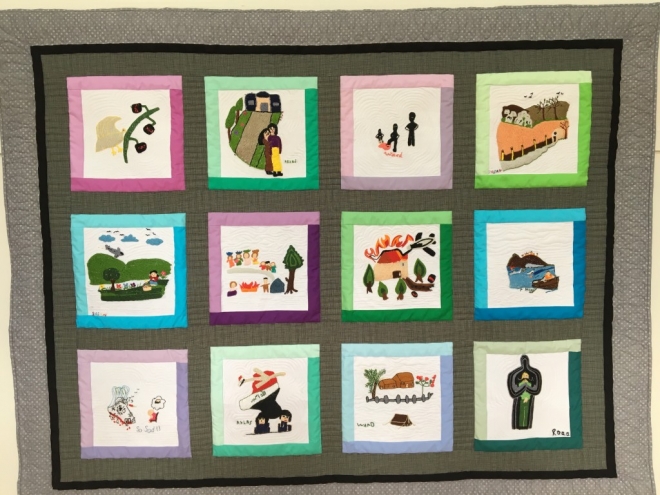 |
|
|
|
|
Second Quilt
Second Quilt
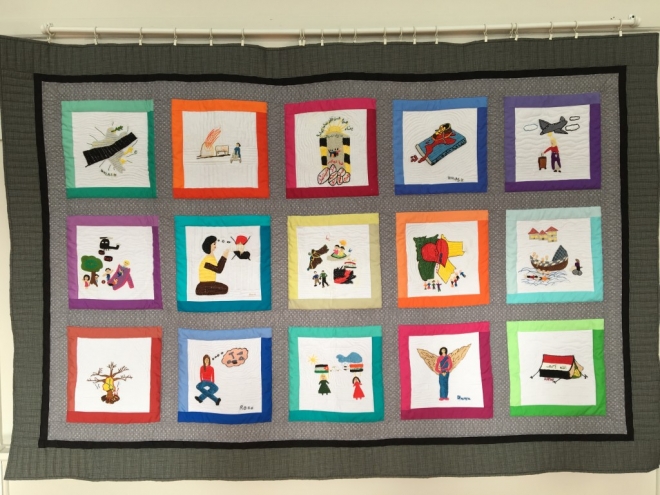 |
|
|
|
|
Third Quilt
Third Quilt
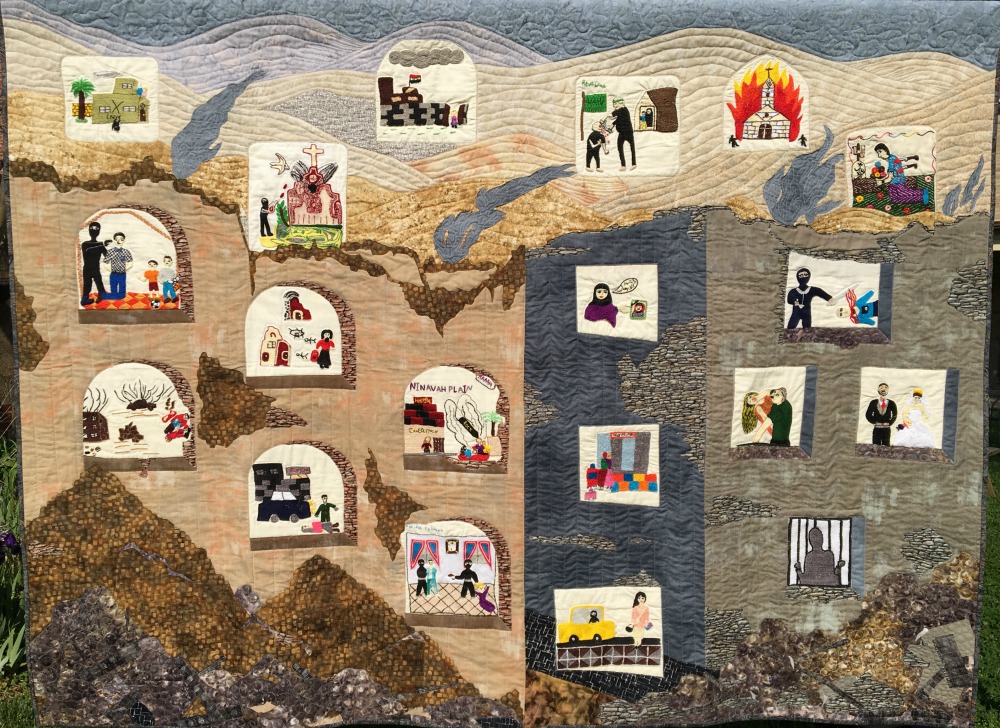
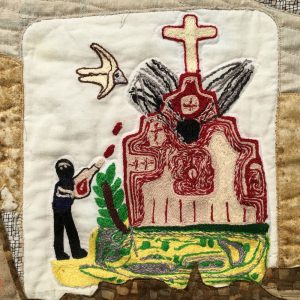 My second drawing represents a beautiful church. ISIS bombed and damaged the church. This caused me a lot of grief and pain because I loved it. It was such a beautiful church. My second drawing represents a beautiful church. ISIS bombed and damaged the church. This caused me a lot of grief and pain because I loved it. It was such a beautiful church. |
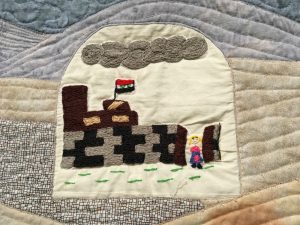 This is what Syria looks like in the building with plants, flowers, and trees. I want the stability and happiness back again. This is what I hope for my children and family. This is what Syria looks like in the building with plants, flowers, and trees. I want the stability and happiness back again. This is what I hope for my children and family. |
|
This drawing reflects the most terrifying event that happened in during the month of Muharram in southern Iraq. It is a religious ritual where people wear black clothes for forty days. They all beat their heads and even their children until they bleed. I feared for my children so we stayed at home. |
|
|
|
|
|
|
|
This is a portrait of someone killed by a member of ISIS. It is an image of a woman I know back in Iraq who tried to protect her son from being kidnapped and tortured from ISIS, but couldn’t.
|
|
|
|
|
|
|
|
|
|
|
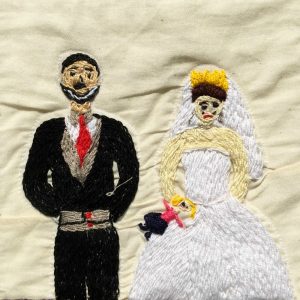 I was forced into an arranged marriage when I was only a child, and I had a miscarriage. I didn’t get a chance to go to school with other children my age. I had to work and support my family including my parents. I was forced into an arranged marriage when I was only a child, and I had a miscarriage. I didn’t get a chance to go to school with other children my age. I had to work and support my family including my parents. |
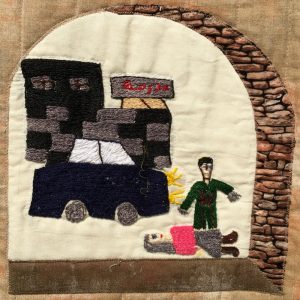 This is an image of children being killed outside a school in my neighbourhood in Syria. Some of the children were killed missiles outside schools. I remember seeing blood and bodies on the ground. This is an image of children being killed outside a school in my neighbourhood in Syria. Some of the children were killed missiles outside schools. I remember seeing blood and bodies on the ground. |
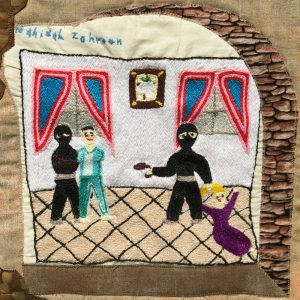 This is an image of my husband and I, we are Sabians. One day we found an ‘X’ mark on our door, which meant that we were targets for ISIS. This is an image of my husband and I, we are Sabians. One day we found an ‘X’ mark on our door, which meant that we were targets for ISIS. |
|
|
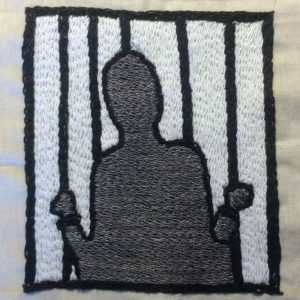 My husband and son were tortured and imprisoned in Syria, but it also expresses how I feel right now. I feel trapped because I can’t go anywhere, or do anything. I would stay at home and cry every day in the dark. My husband and son were tortured and imprisoned in Syria, but it also expresses how I feel right now. I feel trapped because I can’t go anywhere, or do anything. I would stay at home and cry every day in the dark. |
Fourth Quilt
The Fourth (“Hope”) Quilt
|
My dream for the future is to live in a big house with my family and children playing outside without any problems.
|
|
|
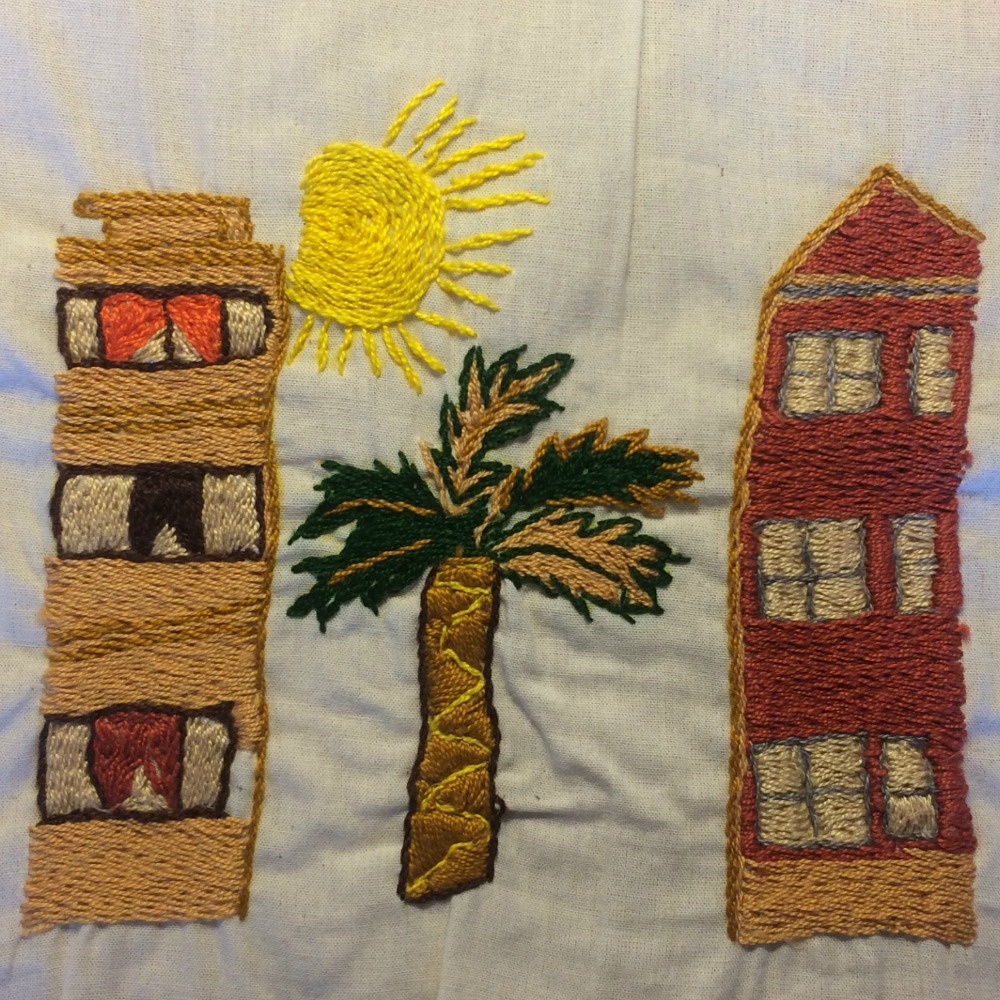 This is what Syria look like in the building with plants, flowers, and trees. I want the stability and happiness back again. This is what I hope for my children and family. This is what Syria look like in the building with plants, flowers, and trees. I want the stability and happiness back again. This is what I hope for my children and family. |
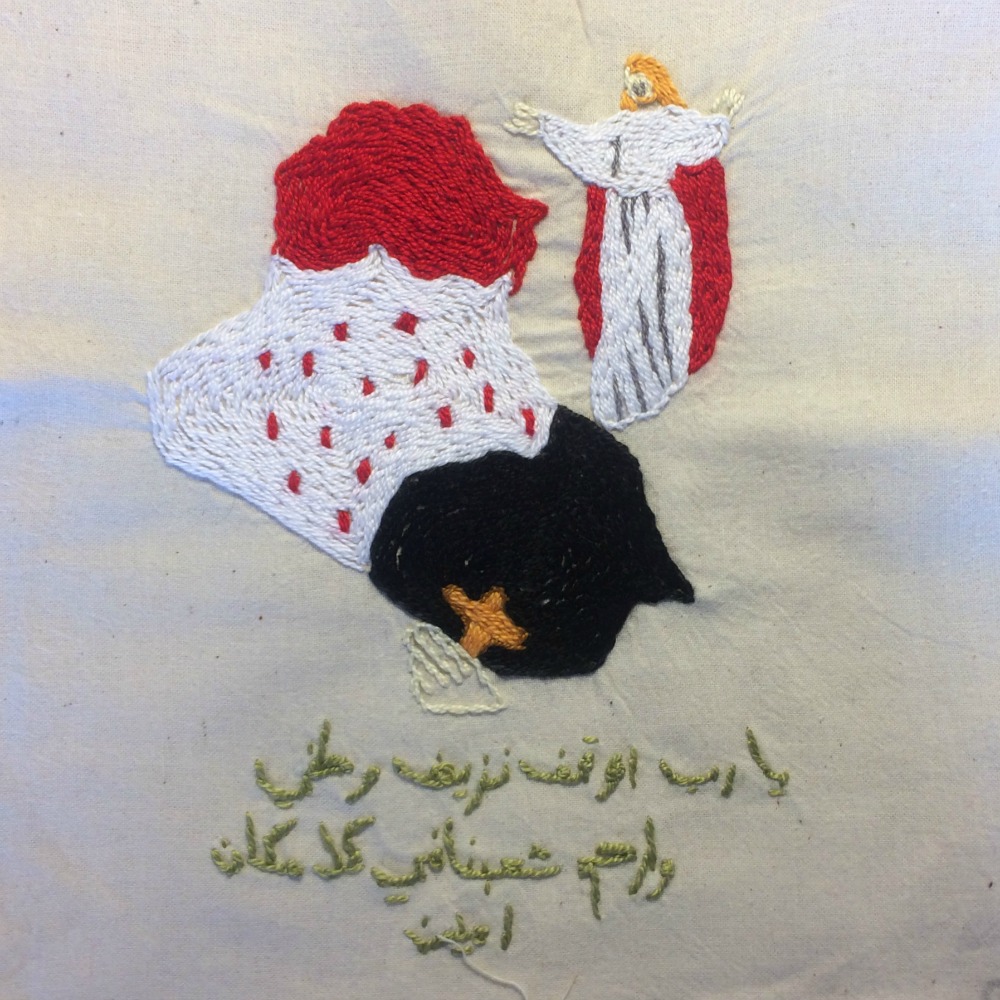 This picture is Iraq ‘bleeding’ because of the bad things happening there, but I have no worries because there are two Angels always there to protect me. This picture is Iraq ‘bleeding’ because of the bad things happening there, but I have no worries because there are two Angels always there to protect me. |
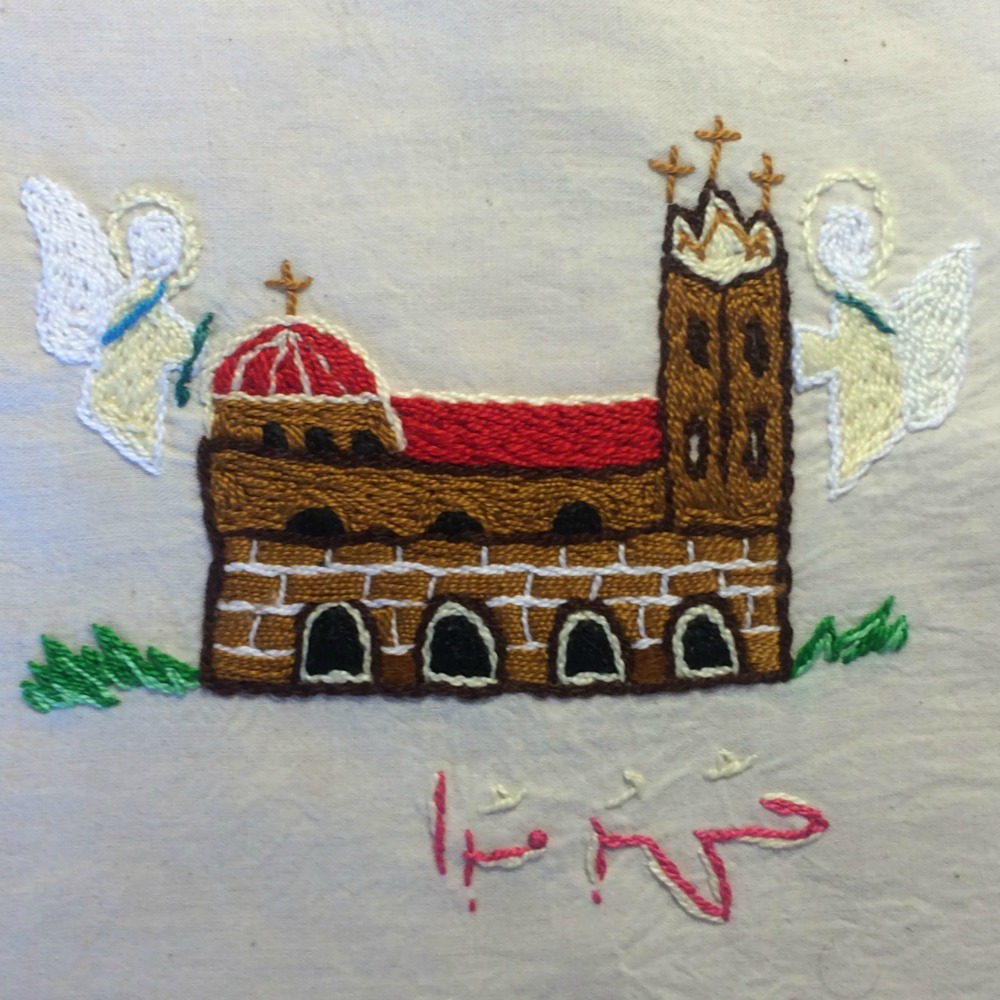 This is my church in my hometown where I grew up. I drew this church because I miss it and I want to go back and pray inside it again. This is my church in my hometown where I grew up. I drew this church because I miss it and I want to go back and pray inside it again. |
|
|
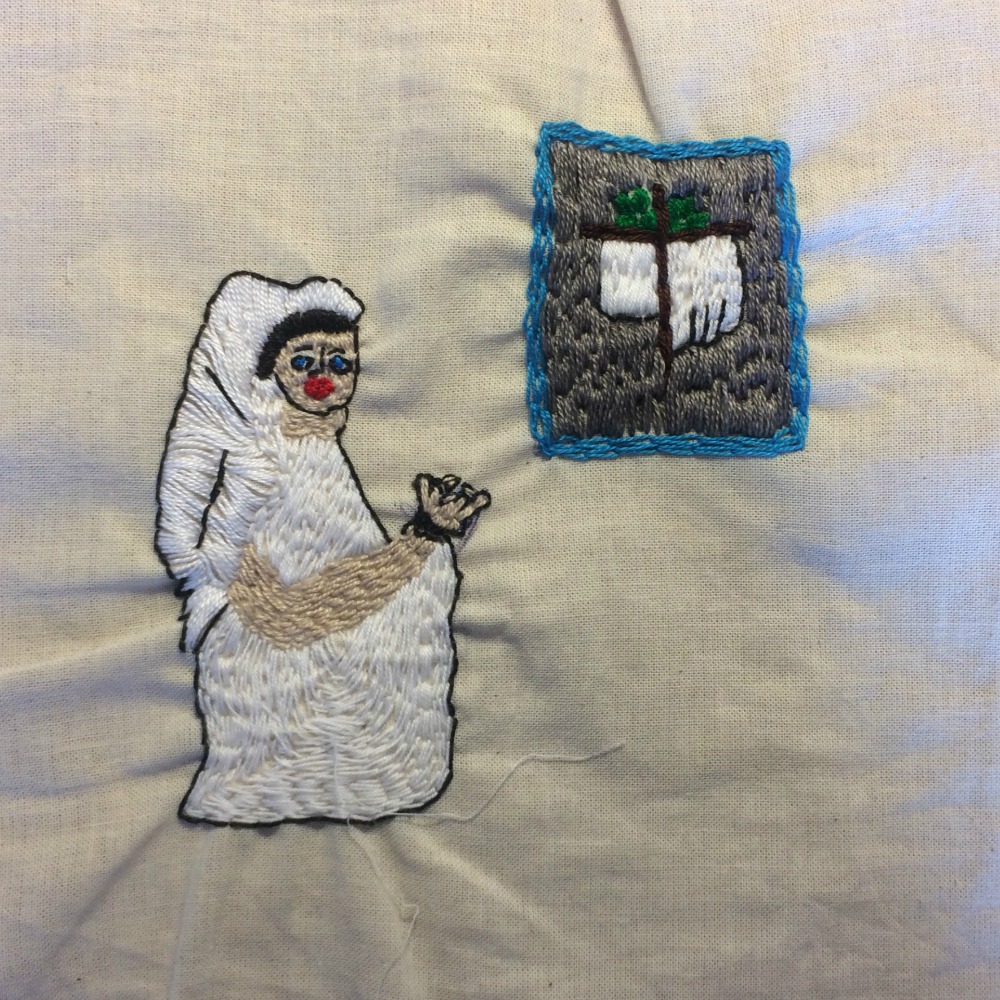 I drew of an image of myself praying in front of the Darfash symbol because praying is the only that gives me strength and patience. I drew of an image of myself praying in front of the Darfash symbol because praying is the only that gives me strength and patience. |
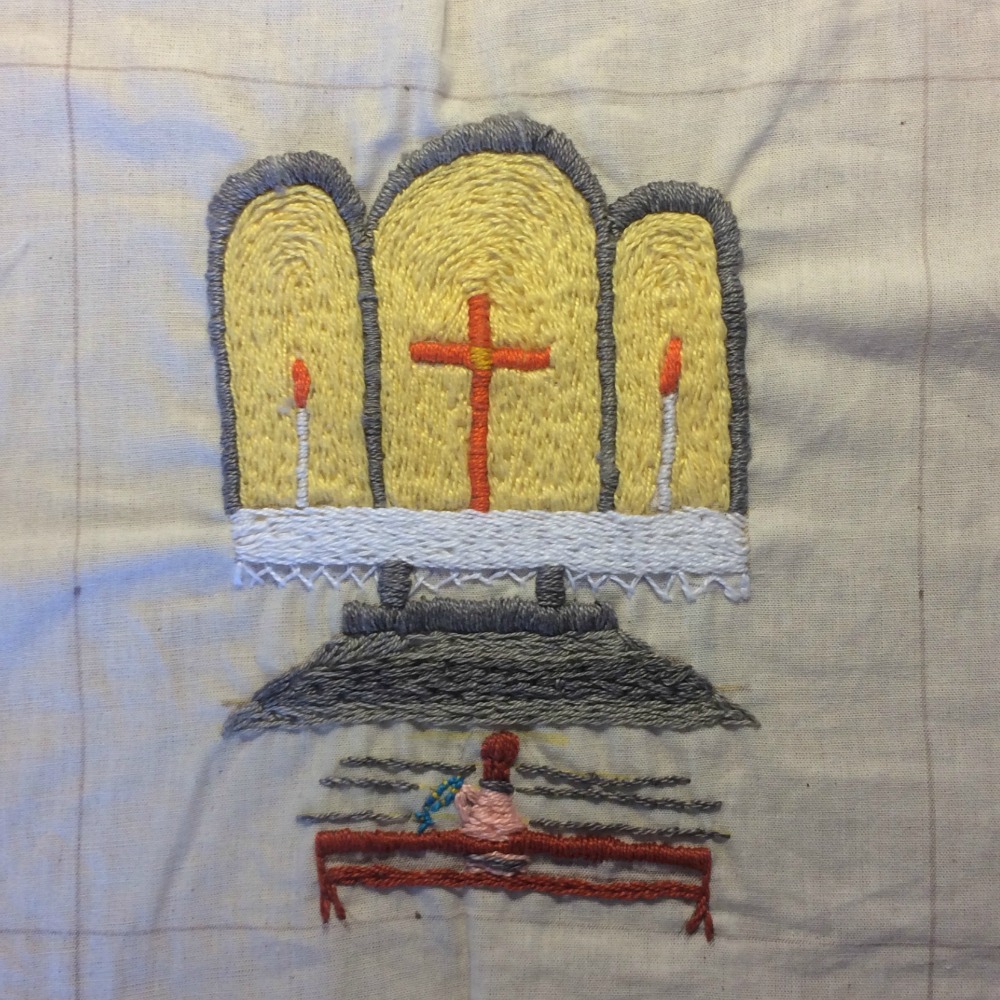 This is drawing of my church in Iraq. I felt brave and free when I went to pray. It is the only thing I have left that no one can take away from me. This is drawing of my church in Iraq. I felt brave and free when I went to pray. It is the only thing I have left that no one can take away from me. |
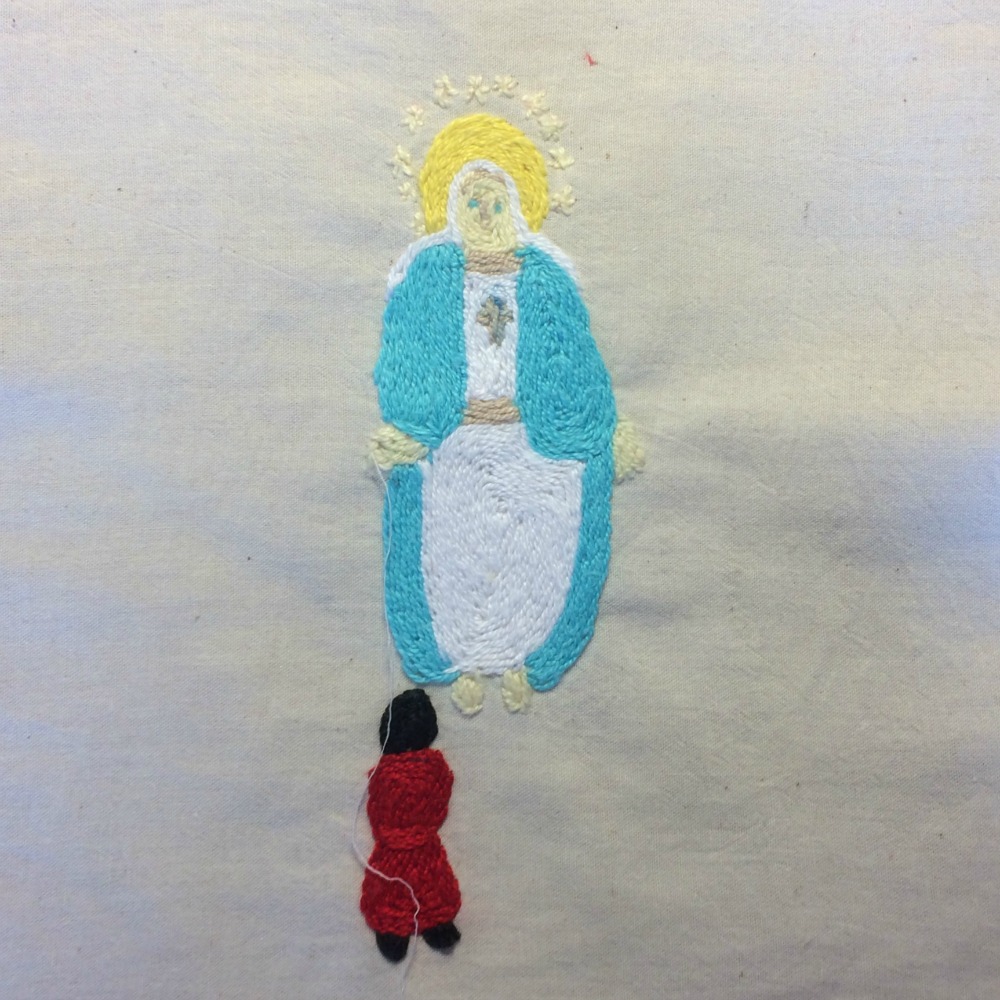 This drawing represents ‘Virgin Mary’ and I am on my knees praying, asking her for peace in the world especially in my town (Qaraqosh) This drawing represents ‘Virgin Mary’ and I am on my knees praying, asking her for peace in the world especially in my town (Qaraqosh) |
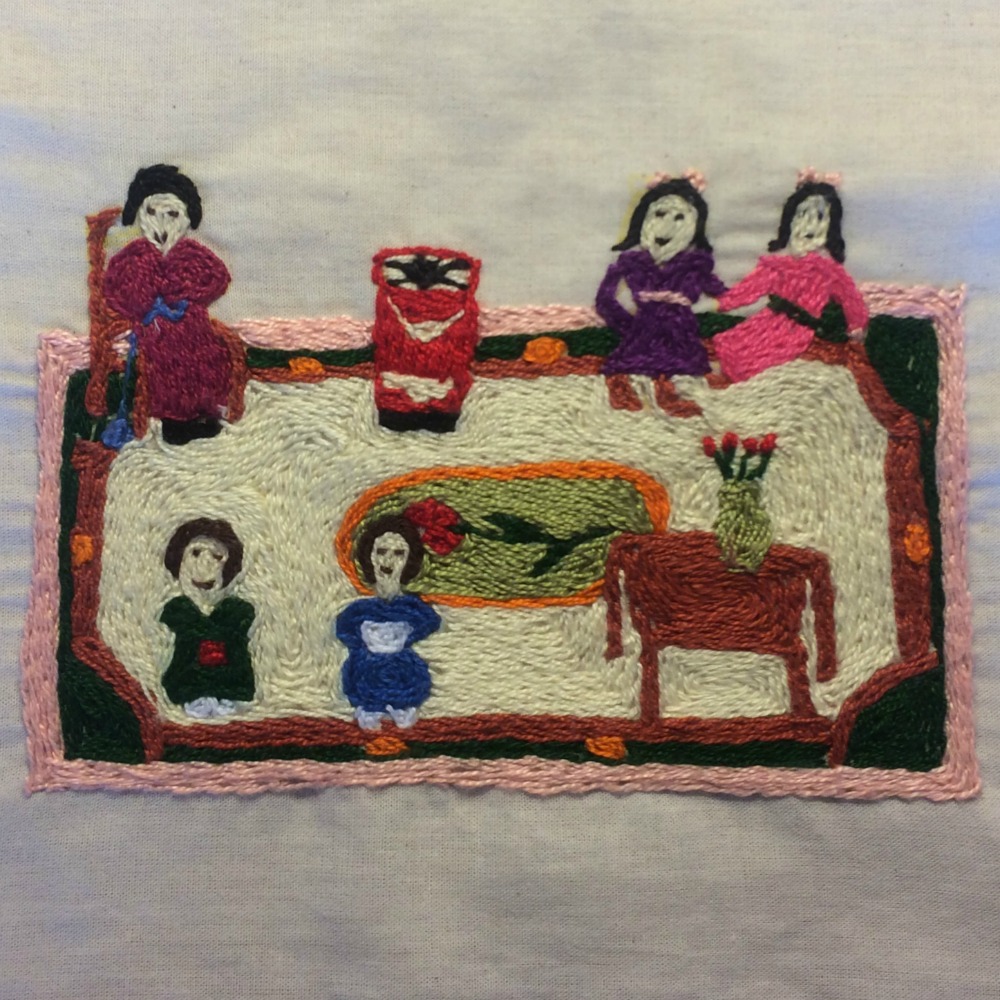 My second drawing is of my family in Iraq. This is a story of my kind and warm mother cooking and playing with her children surrounding her. My second drawing is of my family in Iraq. This is a story of my kind and warm mother cooking and playing with her children surrounding her. |
|
|
Fifth Quilt
Sixth Quilt
Wallhanging
Wallhanging
|
When I remember my hometown, I think about the times with my sister, shopping and enjoying our time together in the house we lived in with our family. We didn’t have much water and electricity the electricity would cut off from time to time. We bought the candles so I can teach my skills and work from home.
|
|
|
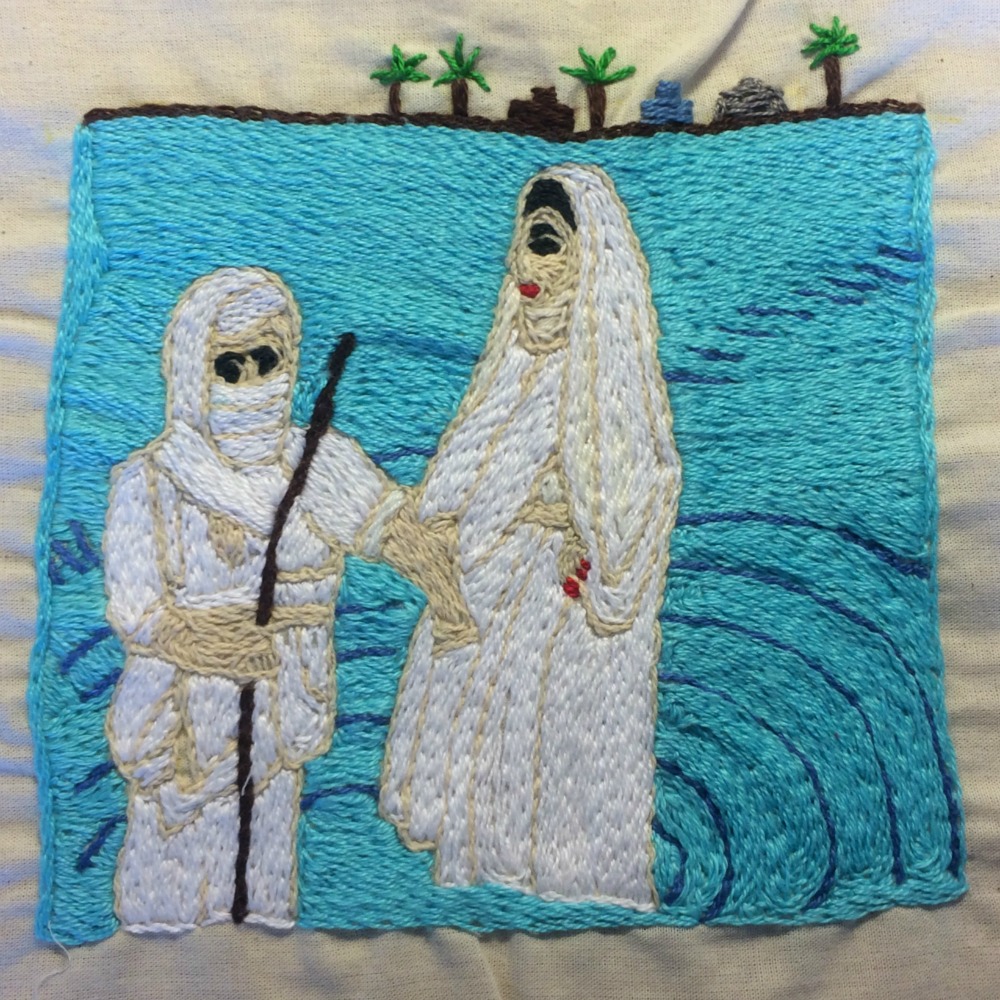 It’s Sabian wedding and the shaykh baptizes the bride in the river. We were wearing a traditional white dress. It’s Sabian wedding and the shaykh baptizes the bride in the river. We were wearing a traditional white dress. |
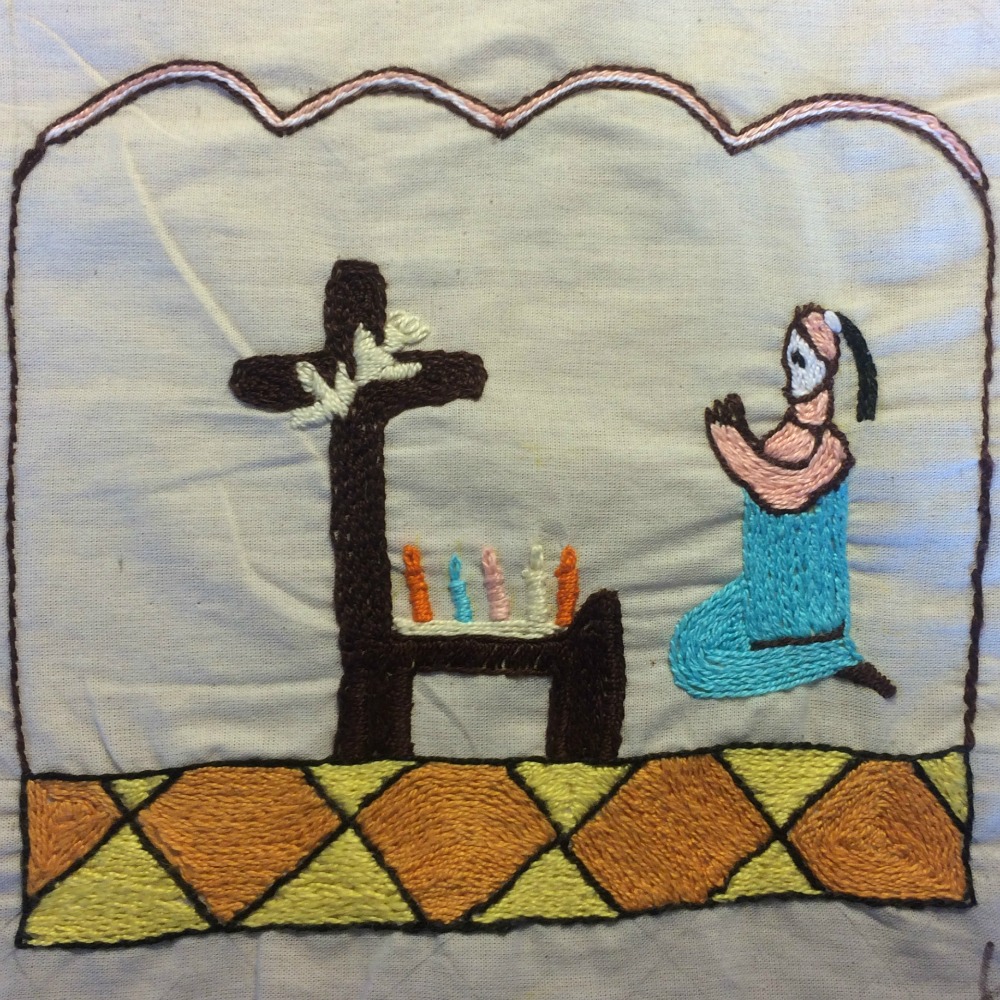 I am kneeling and praying to God to accept my prayer. I am kneeling and praying to God to accept my prayer. |
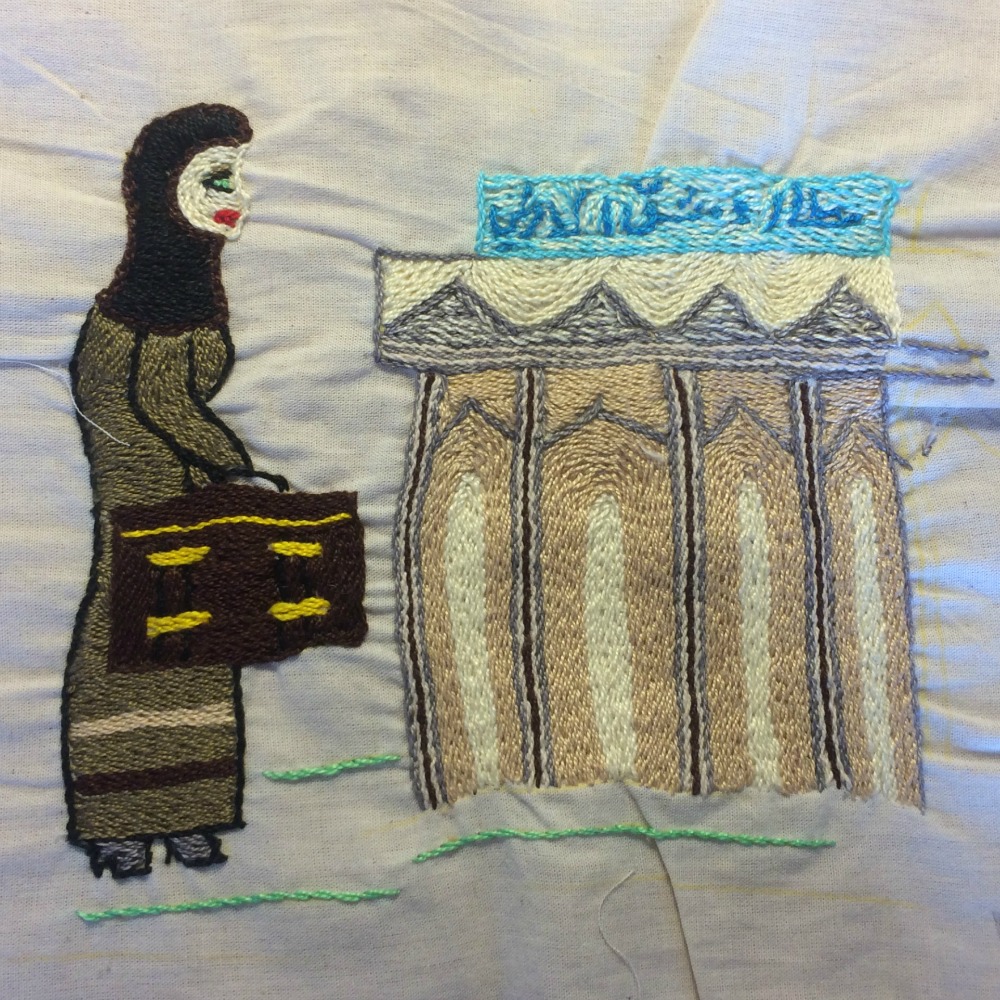 My dream is to go back to Syria. I imagine myself standing in the middle of the airport in Damascus holding my bags and feeling a wave of emotions in my heart, like I am home and that I never left. My dream is to go back to Syria. I imagine myself standing in the middle of the airport in Damascus holding my bags and feeling a wave of emotions in my heart, like I am home and that I never left. |

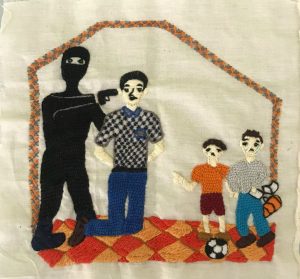
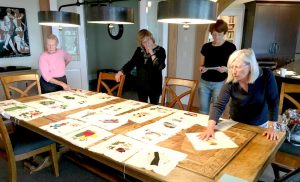
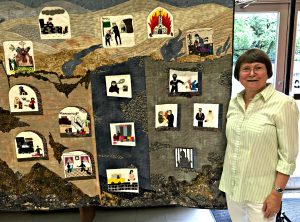
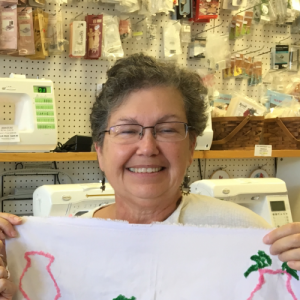
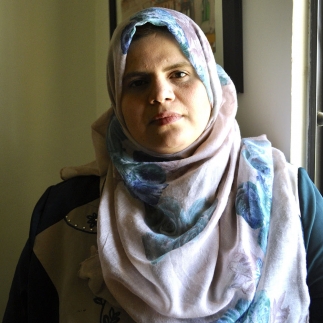 from Baghad in June 2015. Her daughter is sick, and Suzanne wanted to get her involved in some art-related activities, which she found at the Hope Workshop. Suzanne says before she joined the Workshop she was always home alone. She wanted something to do with her time and the Workshop has allowed her to be productive and use her embroidery skills. Embroidery also helps her to express her feelings. She has made many friends at the Workshop and treasures these new friendships.
from Baghad in June 2015. Her daughter is sick, and Suzanne wanted to get her involved in some art-related activities, which she found at the Hope Workshop. Suzanne says before she joined the Workshop she was always home alone. She wanted something to do with her time and the Workshop has allowed her to be productive and use her embroidery skills. Embroidery also helps her to express her feelings. She has made many friends at the Workshop and treasures these new friendships.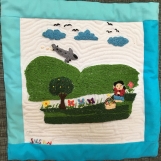
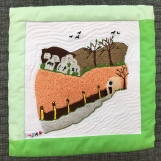
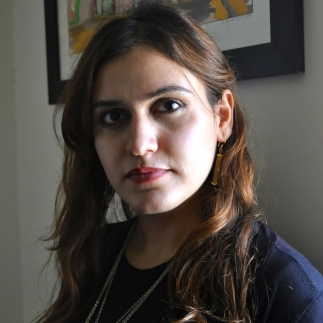 her father, mother, and two sisters in May of 2013. Her mother, Dhamya, was attending Hope Workshop meetings and when Roa’a heard about the embroidery project, she decided to join in. “I didn’t know how to do embroidery,” she says, “but I knew I could learn.”
her father, mother, and two sisters in May of 2013. Her mother, Dhamya, was attending Hope Workshop meetings and when Roa’a heard about the embroidery project, she decided to join in. “I didn’t know how to do embroidery,” she says, “but I knew I could learn.”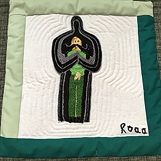
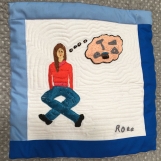
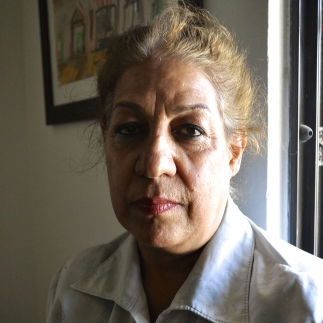 from Bagdhad in 2013. She remembers feeling afraid when she arrived. “It was a new society. Dealing with people was challenging,” she says. She heard about CRP from neighbors and began coming for English classes. She became more and more involved in CRP activities, first with gender training and then with Hope Workshop. “I started to love myself,” she says. She wanted to meet new people from different backgrounds and learn about different cultures.
from Bagdhad in 2013. She remembers feeling afraid when she arrived. “It was a new society. Dealing with people was challenging,” she says. She heard about CRP from neighbors and began coming for English classes. She became more and more involved in CRP activities, first with gender training and then with Hope Workshop. “I started to love myself,” she says. She wanted to meet new people from different backgrounds and learn about different cultures.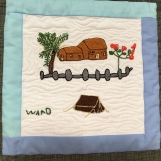
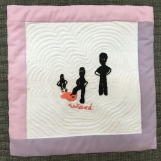
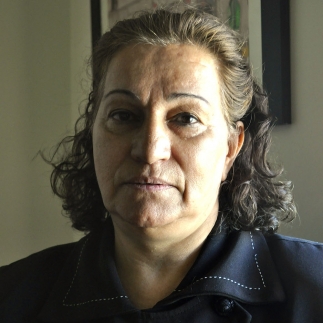 from Baghdad in 2014. They were all scared, she says. Salima rented a small apartment in Hashemi Shemali, where she heard from neighbors about CRP. After some encouragement from Shatha, the coordinator of the Hope Workshop, Salima joined. She has been a valuable member ever since. “I love art,” Salima explains.
from Baghdad in 2014. They were all scared, she says. Salima rented a small apartment in Hashemi Shemali, where she heard from neighbors about CRP. After some encouragement from Shatha, the coordinator of the Hope Workshop, Salima joined. She has been a valuable member ever since. “I love art,” Salima explains.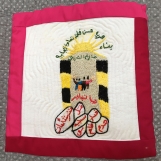
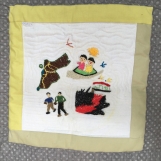
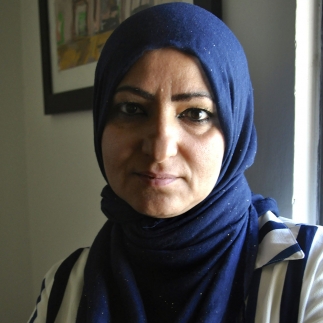 incredible journey. She was living in Ramadi, Anbar province, Iraq, when militants entered her town and killed her cousin. Ikhlas and her neighbors were rounded up and taken to a large building but Ikhlas and her sister managed to escape. They were picked up by a kind stranger in a van who took them out to the desert, from where they made their way to Baghdad.
incredible journey. She was living in Ramadi, Anbar province, Iraq, when militants entered her town and killed her cousin. Ikhlas and her neighbors were rounded up and taken to a large building but Ikhlas and her sister managed to escape. They were picked up by a kind stranger in a van who took them out to the desert, from where they made their way to Baghdad.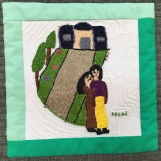
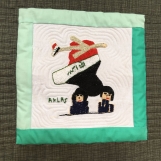
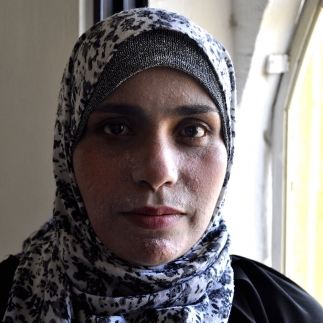 in April 2012 with with her mother and sister. Her husband and children had left earlier and she had hoped to follow them, but the violence in Dara’a prevented them from traveling. As a result, Amal was separated from her husband and children for two years.
in April 2012 with with her mother and sister. Her husband and children had left earlier and she had hoped to follow them, but the violence in Dara’a prevented them from traveling. As a result, Amal was separated from her husband and children for two years.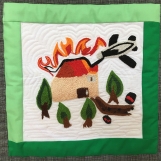
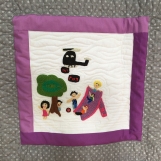
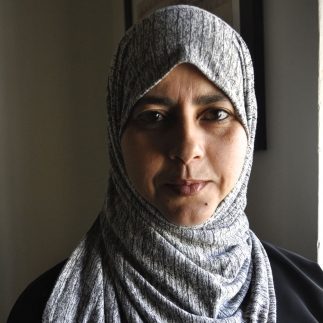 1967 War. Her roots are in Yaffa and Gaza. She feels sad that the Palestinians who live in Gaza today are trapped and do not have the same opportunity to flee danger.
1967 War. Her roots are in Yaffa and Gaza. She feels sad that the Palestinians who live in Gaza today are trapped and do not have the same opportunity to flee danger.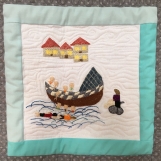
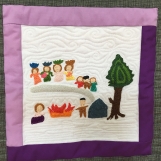
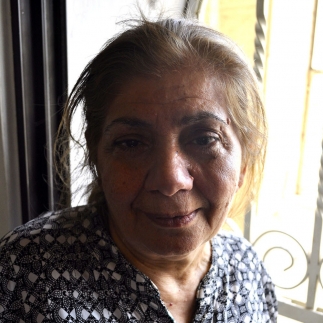 2015 with her daughter, Aftab. Aftab was standing outside the CRP community center when she overheard a conversation between Shatha, the Hope Workshop coordinator, and a group of women. Aftab was interested, and thought her mother would be too. She brought Fakhriaya to a Hope Workshop meeting. The two have been members ever since.
2015 with her daughter, Aftab. Aftab was standing outside the CRP community center when she overheard a conversation between Shatha, the Hope Workshop coordinator, and a group of women. Aftab was interested, and thought her mother would be too. She brought Fakhriaya to a Hope Workshop meeting. The two have been members ever since.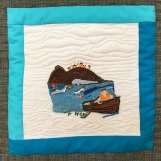
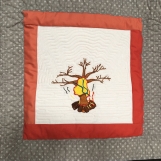
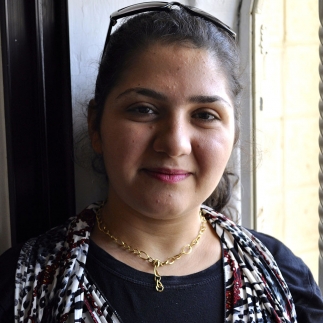 mother Fakhriaya in 2015 and discovered the Hope Workshop after overhearing a conversation between Shatha, the Workshop coordinator and a group of women. She was looking for company and did not want to remain at home, so she signed up.“ I like to talk a lot and working together with others has helped me become a better listener and communicator,” she says.
mother Fakhriaya in 2015 and discovered the Hope Workshop after overhearing a conversation between Shatha, the Workshop coordinator and a group of women. She was looking for company and did not want to remain at home, so she signed up.“ I like to talk a lot and working together with others has helped me become a better listener and communicator,” she says.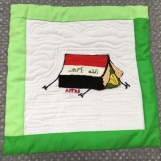
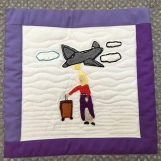
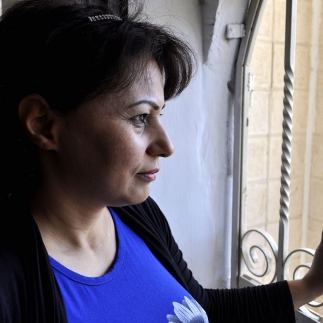 her father and sister in June 2015. Once in Amman, she reunited with sister who had already settled in Jordan and put her in touch with CRP.
her father and sister in June 2015. Once in Amman, she reunited with sister who had already settled in Jordan and put her in touch with CRP.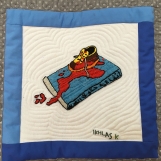
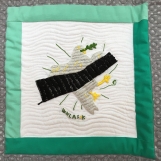
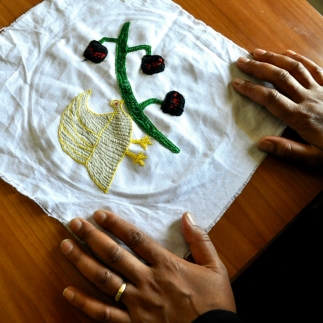 face, so we show her hands at work on her embroidery.
face, so we show her hands at work on her embroidery.